Probing the Prophets

Rabbi Nachman Winkler

Page 30
Candle Lighting
Rebbetzin Zemira Ozarowski

Page 56
In memory of my parents Yitzchak & Chana Heller z"l Dedicated by their daughter Dvorah Gorman

Probing the Prophets

Rabbi Nachman Winkler

Page 30
Candle Lighting
Rebbetzin Zemira Ozarowski

Page 56
In memory of my parents Yitzchak & Chana Heller z"l Dedicated by their daughter Dvorah Gorman
04 Dear Torah Tidbits Family
08
Rabbi Avi Berman
Memory, Identity, and Positivity
Rabbi Moshe Hauer
12 Aliya By Aliya Sedra Summary
20
24
30
Rabbi Reuven Tradburks
The Rich Fruits of Forgiveness
Rabbi Dr. Tzvi Hersh Weinreb
The Limits of Love
Rabbi Lord Jonathan Sacks zt"l
Probing the Prophets
Rabbi Nachman Winkler
32 OU Israel Schedule
40
Importance of Hakarat Hatov
Rabbi Shalom Rosner
42 Incredible Impact
Rebbetzin Shira Smiles
THIS
44 Baderech
48
50
Rabbi Judah Mischel
Simchat Shmuel
Rabbi Sam Shor
Free Will in the Messianic Era

Rabbi Moshe Taragin
54 From Embarassed to Embraced Rebbetzin Dr. Adina Smidman
56
58
Candle Lighting
Rebbetzin Zemira Ozarowski
Whose Responsibility Is Raising the Wall?
Rabbi Daniel Mann
60 The Y- Files Weekly Comic Netanel Epstein
62
Torah 4 Teens by Teens
Dassi Zelig // Yehuda Sunshine
Photographd by Yaakov Adler, Ramat Bet Shemesh
This reminds me of the mitzvah of Kelayim. But in a different sense, the separation of heaven and the growing earth. They never mix.
7 Days After Molad
7 Elul/ Wed. night ,Aug. 23
Last Opportunity to Say Kiddush Levana until 14 Elul, Wed. night. Aug. 30, all night
BY RABBI CHANOCH
R av, Beit Knesset Beit Yisrael, Yemin Moshe
)ט:דכ( םירצממ םכתאצב ךרדב םירמל ךיקולא 'ה השע תא רוכז
"Remember what the L-rd your G-d did unto Miriam, by the way as you came out of Egypt." (24:9)
Rashi quotes the Sifrei that if you desire to guard yourself against being smitten with leprosy, do not relate to evil talk. This can be proven from the case of Miriam. As soon as she spoke Lashon Harah about her brother Moshe, she was stricken with plagues.
Yet, why is the intense language of "Zachor"- "Remember" used by Miriam?
Nachmanides (Rabbi Moshe ben Nachman 1194-1270) explains the importance in stressing this mitzvah of remembering the case of Miriam because even though it may seem improper to talk about what a righteous woman did and even seems as we would be talking Lashon Hara ourselves by discussing what she did, the Torah commands us to publicize what happened in order to emphasis the warning against Lashon Harah. This verse contains a great admonition to refrain from it both in public and private, whether with intent to hurt and to shame or with no intent to harm at all.
Shabbat Shalom
Ranges 11 days Wed - Shabbat
August 23 - Sept 2 / 6 - 16 Elul
All Times According to MyZmanim (20 mins before Sunset in most Cities; 40 mins in Yerushalyim and Petach Tikva; 30 mins in Tzfat and Haifa)
Daf Yomi this Shabbat: Kidushin 13
OU Kashrut NCSY Jewish Action JLIC NJCD / Yachad / Our Way OU West Coast OU Press Synagogue/Community Services OU Advocacy OU Israel
MITCHEL R. AEDER, PRESIDENT OF THE ORTHODOX UNION Yehuda Neuberger, Chairman of the Board, Orthodox Union | Dr. Josh Penn, OU Kashrus Commission
RABBI MOSHE HAUER, EXECUTIVE VICE PRESIDENT | RABBI JOSHUA M. JOSEPH, ED.D.
EXECUTIVE VICE PRESIDENT & CHIEF OPERATING OFFICER Rabbi Dr. Tzvi Hersh Weinreb, Exec. V.P. Emeritus
OU KOSHER: Rabbi Menachem Genack, CEO/Rabbinic Administrator OU Kosher | Rabbi Moshe Elefant, COO/Executive Rabbinic Coordinator ISRAEL: Rabbi Yissachar Dov Krakowski, Rabbinic Administrator | Rabbi Ezra Friedman, The Gustave and Carol Jacobs Center for Kashrut Education/ Deputy Rabbinic Administrator
Headquarters: 40 Rector St. 4th floor, New York, NY 10006 212-563-4000 website: www.ou.org
Editor Emeritus: Phil Chernofsky
Editor: Rabbi Aaron Goldscheider | aarong@ouisrael.org
Advertising: Ita Rochel | 02-5609125 or ttads@ouisrael.org
Website: www.torahtidbits.com
Not getting enough TTs? Too many? None at all?
Contact our DISTRIBUTION 050-577-2111 • ttdist@ouisrael.org
Seymour J. Abrams • Orthodox Union Jerusalem World Center • Avrom Silver Jerusalem College for Adults • Wolinetz Family Shul • Makom BaLev • Birthright • Yachad • NCSY in Israel • JLIC in Israel • Camp Dror • Pearl & Harold M. Jacobs ZULA Outreach Center • The Jack Gindi Oraita Program • OU Israel Kashrut
STUART HERSHKOWITZ, PRESIDENT OU ISRAEL
Zvi Sand / Yitzchak Fund: Former Presidents, OU Israel | Rabbi Emanuel Quint z”l, Senior Vice President | Prof. Meni Koslowsky, Vice President
VAAD MEMBERS:
Michael Elman | Yonatan Frankel | Yitzchak Fund | Daniella Hellerstein | Stuart Hershkowitz | Jeremy Lustman | Meir Raskas | Atara Reichel | Zvi Sand | Norman Schmutter | Mark Schneider | Esther Williams
RABBI AVI BERMAN, EXECUTIVE DIRECTOR, OU ISRAEL
David Katz, CFO, OU Israel | Chaim Pelzner, Director of Programs, OU Israel | Rabbi Sam Shor, Director of Programs, OU Israel Center | Rabbi Sholom Gold zt"l, Dean, Avrom Silver Jerusalem College for Adults
22 Keren HaYesod <> POB 1441 <> Jerusalem 9101032
phone: (02) 560 9100 | fax: (02) 561-7432
email: office@ouisrael.org
website: www.ouisrael.org
Founders and initial benefactors of the OU Israel Center: George and Ilse Falk a"h
Torah Tidbits and many of the projects of OU Israel are assisted by grants from THE JERUSALEM MUNICIPALITY
OU Israel, Torah Tidbits does not endorse the political or halachic positions of its editor, columnists or advertisers, nor guarantee the quality of advertised services or products. Nor do we endorse the kashrut of hotels, restaurants, caterers or food products that are advertised in TT (except, of course, those under OU-Israel hashgacha). Any "promises" made in ads are the sole responsibility of the advertisers and not that of OU Israel, the OU Israel Center , Torah Tidbits.

What harm can a silly meme (often a captioned photo) truly cause? While I set very strict social media limits for myself, every now and then I come across a meme or photo that I think will bring someone a smile, and forward it along. But while I enjoy content that captures the honesty of the lives we lead, there are two subject matters I never engage with: those that are lighthearted about the education of children or put a negative light on marriage.
While most content is shared in good fun I believe there is a strong possibility a person will choose to adopt the perspective of what they see as their truth. This might not seem particularly significant, but when that person is a child, it can have a direct impact on their growth. While in jest, as a parent I am fully aware that the things I choose to laugh at will likely shape how my children view that subject matter whether or not they understand my viewpoint.
This Shabbat signals the end of summer vacation, and summer break is never easy for parents - especially those living in Israel. The late-August pressure in which camp ends and parents are tasked with finding meaningful activities to keep their kids engaged while juggling jobs is a significant burden.OU Israel is made up of 10% of the OU’s global employee base, with roughly 350 dedicated employees - many of whom are parents. During this time OU Israel offices around the country are often emptier than usual as parents take
vacation to be with their kids, and I remain grateful for their dedication while juggling between supporting the needs of Am Yisrael and their children.
This pressure is reflective of a larger dynamic that is challenging for those who have the zechut of raising children in Eretz Yisrael, where the high cost of living forces many parents to work to keep finances in order. During the school year this means many parents are unable to shoulder the responsibility of chinuch habanim alone, and rely on teachers to guide the bulk of their children’s growth. As a result, come September 1st my phone begins to buzz with the latest memes shared by tired parents, reflecting relief that teachers are once again taking charge of creating structured learning for their kids.
Such memes often showcase parents dropping kids off at school with a caption, “Tag, you’re it!” as they head out to the beach for a vacation. I deeply struggle with this sentiment and am disheartened by this type of content. As parents, we are never
We send continued wishes of nechama to his entire family
absolved of our responsibility to teach our children and involve ourselves in their growth - even when they are in school. During the school year teachers and parents engage in a direct partnership, sharing the burden of chinuch habanim while molding our children to follow in our shared vision. This partnership must be treated seriously.
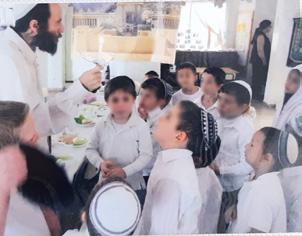
While a meme might only be a meme, I find it indicative of a larger issue of chinuch habanim facing our generation. Too often I hear complaints from parents, “I have a hectic work schedule and spend money to send my child to an amazing school. And yet I’m not impressed with the results I’m seeing.” Of course, while every teacher - including Moshe Rabbeinu - makes mistakes, there is so much to be grateful for and the attitude we show our children toward their teachers will be the one they too adopt in the coming year.
I believe there is a connection between the input of parents and the outcome of children - that one action leads to another, and this week’s parsha shows us this in an extreme form. Ben Sorer U’moreh is the wayward and defiant son who does not listen to his parents when they discipline him. According to Rashi in passuk 18, the wayward son follows a path which ultimately leads to his destruction.
As a rebellious child he steals. When he steals he uses the money to maintain his gluttonous habit. To maintain his lifestyle,
the son abuses those around him to steal from them. The sifsei chamamim explains that ultimately, the son will become so wicked in his ways that he’ll stop at nothing to get what he wants that the Torah predicts he will eventually kill people to get what he wants. Because of this, the Torah decrees that the Ben Sorer U’moreh be killed. Chazal teaches us that the case of Ben Sorer U’moreh never existed and provides insight into the ways in which one action can lead us down a dangerous path.
Parents today face unprecedented challenges in chinuch habanim. The streets of Israel are flooded with teenagers, many of whom are involved in dangerous behavior. OU Israel’s programs for teens, including The Pearl & Harold Jacobs Zula Outreach Center, the Jack E. Gindi Oraita Program and Makom Balev centers in 20 cities across the country are brimming with teens looking for stability.
In many cases, these teens have dropped out of school systems and do not have structured learning to support healthy productivity and growth. In this setting OU Israel advisors strive to serve as the positive role models these children cannot find at home, and I admire their ability to connect with kids from all backgrounds, giving them a place of comfort and warmth to turn to.
My wife and I recognize that if we adopt a lighthearted approach to education, our children will most certainly follow suit. We
therefore make a concerted effort to show our kids the respect we have for education and gratitude for their teachers. Fortunately, we have seen the impact of amazing teachers on our children - last Shabbat being our most recent example.
As I wrote last week, my family spent last Shabbat in Netanya. For Seudah Shlishit, I took my boys to Heichal Eliyahu. I struck up a conversation with the man sitting to my left. Once I introduced myself the man shared his enjoyment of the Radio Galey Yisrael radio show I host with Rav Shmuel Eliyahu shlita, and we chatted a bit more.
Realizing the man looked familiar I asked where he was from, when my 10-year-old son Mordechai leaned over and said, “Abba, this is my rebbe from gan!” The rav looked at him again and burst into a huge smile and with tremendous warmth began to catch up with my son.
I wasn’t surprised to see Mordechai’s face beaming with joy and pride. Although I’m not quite sure how much my son remembers from gan, the love he felt from his rebbe and the girsa d'yankuta (lessons learned as a young child) clearly made an impact on him. As they continued their conversation I was overcome with heartfelt gratitude to the Borei Olam for allowing my children to be molded by such caring and impactful
May the Torah learned from this issue of Torah Tidbits be נ”על my son
Eliezer Shmuel ben Yosef (Jeffery) z”l
on his 30th Yarzheit - 7 Elul
Yehudit Lipman
educators who are helping my wife and I raise our children to become bnei Torah.
This week in particular, parents are presented with a critical moment in chinuch habanim. As we send our kids off to school I daven that HaKadosh Baruch Hu gives us the sechel tov, binah and daat to identify the opportunities for our children’s growth in the coming year. I encourage parents to take a moment to be mechazek the educators taking on the responsibility of teaching our children in the coming days. May we all be successful in our shared mission of raising children who follow in the path of Torah.
In the spirit of recognizing the importance of education, I turn my attention to the recent loss the OU experienced with the passing of Mel David a”h. A dear friend and mentor, Mel was instrumental in supporting many OU educational programming together with his wife Sylvia. They helped get Yachad off the ground in the US, supported the development of OU Israel and The Zula.
Giving everything they could to ensure the next generation of Jewish children would receive what they need to thrive and reach their potential, Mel was a role model to many struggling teens who came his way. I remain deeply moved by the heartfelt way with which Mel gave himself to Klal Yisrael. May we merit to follow in his footsteps. Wishing the David family comfort during this time.
Wishing you all an uplifting and inspiring Shabbat,
Rabbi Avi Berman Executive Director, OU Israel aberman@ouisrael.org









Memory is identity. This was expressed beautifully by Rabbi Sacks z”l in his Haggadah commentary:

“There is a profound difference between history and memory. History is his story –an event that happened sometime else to someone else. Memory is my story – something that happened to me and is part of who I am. History is information. Memory, by contrast, is part of identity. I can study the history of other peoples, cultures, and civilizations. They deepen my knowledge and broaden my horizons. But they do not make a claim on me. They are the past as past. Memory is the past as present, as it lives on in me. Without memory there can be no identity.”
The Rebbe of Slonim, author of Nesivos Shalom, wrote similarly regarding the sheish zechiros, the six incidents that we are mandated to always remember (Kuntrus Haharuga Alecha):
“The essence of a Jew is not transient, limited to the time he spends on this earth, rather the Jew’s existence is eternal, embracing the past, the present, and the future… The connection we forge to the eternity inherent in our Jewish soul and to
the world of Klal Yisrael is accomplished through the zechiros, the core elements that comprise our national memory. When a Jew remembers Sinai, the Exodus, or the perpetual threat personified by Amalek, etc., this binds him to both his own eternal soul and to the world of Klal Yisrael, and the more we connect to that eternity the more we are nourished by it.”
Our Parsha contains two of the Torah’s six critical elements of memory, Amalek and Miriam. Remembering the perpetual threat of Amalek is sadly and unsurprisingly core to our Jewish identity; we can never afford complacency relative to the ongoing physical and spiritual threats that arise in each and every generation. But why is the same true of the memory of Miriam’s leprosy, a result of her speaking critically of Moshe? While we understand the terrible damage caused by harmful speech and recognize the Mitzvah value of shemiras halashon (guarded speech), in what way does this memory and vigilance constitute a critical part of our identity?
Magen Avraham (OC 60:1) cites a fascinating passage from the Kabbalistic teachings (Shaar Hakavanos) of Rav Yitzchak Luria, the Arizal, where he suggests that we should explicitly recall each of those six core elements of memory around our recitation of the Shema every morning. Regarding remembering Miriam, he posits that when we say the words v’keiravtanu l’shimcha hagadol selah b’emes, l’hodos
l’cha, speaking of Hashem’s bringing us close to Him in order that we can express our gratitude to Him, it is then that we should recall what happened to Miriam, as “we were created to be grateful rather than to speak negatively.” This idea is expressed in the well-known verse (Tehillim 34:13) that speaks of guarding our speech: “Who is the man who desires life, loves days, to see good.”
The opposite of slander is not silence but effusive positivity and gratitude, and a non-cynical, grateful mindset is indeed a matter of identity. There is no greater identifier than one’s name, and we are all named Jews, Yehudim, meaning – grateful people. That gratefulness colors how we look at each other, at life, and at G-d.
It is not only historical events and experiences that forge identity. Our identity will also be an expression of our attitude and perspective. Gratitude and positivity is a huge part of that. Recalling Miriam, and expressing that memory through an attitude and perspective of positivity and gratitude, is a fundamental part of who we are and who we are meant to be.
המלש האופר

הניאר תב הרוא
Do you have a life insurance policy you:

• No longer want?
• No longer need?
• Can no longer afford the premium?
• Could you use extra money instead of keeping your policy?
I can guarantee that if you qualify with the underwriting process I can get you more money than if you cash it in with the company.
Please contact Moshe Russell at: Buymypolicy32@gmail.com

With the weaker Shekel, your Dollar can now buy you more. The last few bargains at lower dollar prices are still available (some even unlinked). Contact us now for the largest selection of sea-view properties for sale or rent.


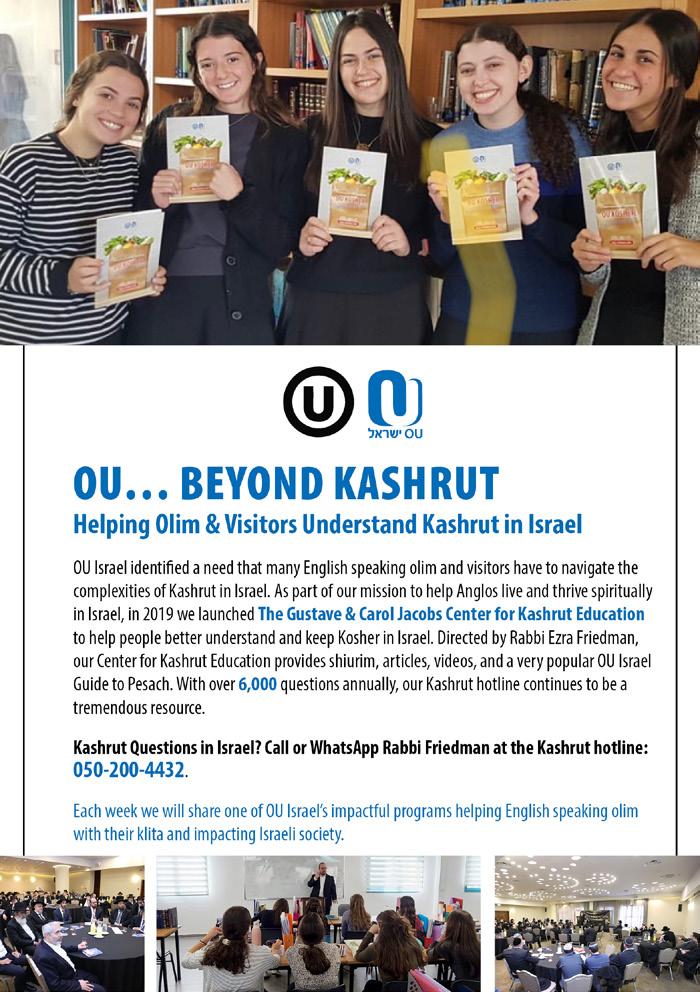
which removes tumah impurity from the ‘subject’- himself becomes ritually impure and barred from the Mikdash. Basically, for one Jew to be ritually rejuvenated, a second Jew becomes ritually invalidated. It takes selflessness to overcome the impurity of death. Dedication to Jews comes at a cost. For one Jew to enter another must voluntarily absorb a religious “cost”.




Dedication to Jews certainly comes at a cost in the modern State of Israel. Life outside of the land of Israel exile doesn’t always come at a “cost” to personal religious standards. Of course, every Jew is responsible for every other Jew regardless of geography, but life in exile more easily allows for personal “ivory towers of piety”. Dedication to other Jews is often expressed at communal levels. Within a community of similarly religious people, the cost of “interaction” and engagement is often minimal.
Life in Israel is very different. Aiming to breath religious spirit into our country, we frequently pay a heavy “price” regarding
052-385-9944


Light and Airy Modern Unit on Zebulon Hammer St.
Includes: Large private balcony, 2 full baths, radiant floor heating, smart home system, central a/c, underground private parking, storage unit, 3rd floor with 2 elevators, one is a dedicated Shabbat elevator, Near new train to Tel Aviv, walking distance to Shuk & Shareei Chessed. 7800nis/month.
by the Israel Museum
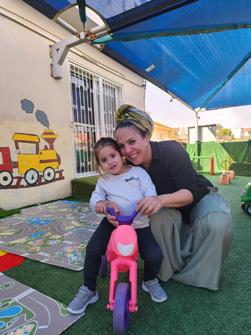
5.5 rooms, 2.5 baths, radiant floor heating, zoned a/c, storage, 2 underground parking spaces, second floor, with large garden overlooking Gan Botani! Asking $4450 including professional gardener.
our own religious standards. If we want to live alongside Jews of different religious “stripes” we may be endangering our own religious standards. For example, extending kashrut food nationwide may dilute kashrut standards. Likewise creating a “shemittah umbrella” to enable basic shemittah observance may entail adopting fragile halachik leniencies. Living in Israeli society at large among the less-religious may challenge our own values and lifestyles. It is ironic – and to some confusing- that life in the holy land should potentially come at a cost to religious standards. Dedication to the Jewish people doesn’t always come free of charge. Are we selfless enough to pay that price?

The Parsha contains 74 mitzvot, the most of any parsha in our Torah. It is the third of the parshiot of Mitzvot; Re’eh, Shoftim and Ki Teitzei. Moshe began his long address in Sefer Devarim with narrative, reviewing the central experiences of the desert and their lessons; his intent was to ensure success in the entry to the Land. He then switched to speaking not about entering the Land, but how to live in the Land; the building of the Jewish nation. In Re’eh and Shoftim, he outlined Jewish National society beautifully. It is to be an ethical monotheistic society; hence, he outlined the laws of avoiding idol worship, the centrality of what would be Jerusalem and laws of generosity, of sharing with others. He then moved on from the principles of ethical monotheism to Nation building; the judiciary, the executive and the legislature. And now in Ki Teitzei, he focuses on personal mitzvot. Nation building requires checks and balances on government and courts. But the government does not make a great nation; it regulates behavior within certain broad frameworks. Greatness will lie in the day-to-day life of the people;
fidelity to our G-d, how we treat each other, help each other, what we say and what we give, how we live with kindness and generosity in day-to-day life. That is where the greatness of the Jewish nation will lie. Perhaps said differently: Parshat Shoftim will produce headlines. The court system, the king, the wars. Now those make good headlines. Parshat Ki Teitzei will never make the headlines: returning a lost object, paying wages promptly, healthy relationships in marriage. Regard for others doesn’t make great headlines, but it does make great nations.
1ST ALIYA (DEVARIM 21:10 - 21)
Captive Woman: One may not marry a woman captured in war until 30 days have elapsed and the passion subsided. First born: The rights of the first born to a double portion shall not be diverted to the first born of a more favored wife. Ben Sorer U’moreh: a boy entering adulthood who is brazen and gluttonous shall be judged on the fear of future more egregious behavior.
The soldier is able to marry the non-Jewish woman captured in war; but only after a month of seeing her daily in an unkempt manner. However, what is left unsaid is far more important: war is accompanied by rape and pillage of women. Women are viewed as the spoils of war. Not in the Jewish army. The permission granted to marry this non-Jewish woman after a month screams out the far more basic war ethic:
war should never ever be seen by the Jewish army as license for abuse of women.
2ND ALIYA (21:22 - 22:7)
Burial: Do not allow the body of one sentenced to death to be hung. He is to be buried immediately. Returning Lost Property: Don’t look away from lost property; return it to its owner. Help up an overly burdened animal who has buckled; don’t look away. Do not cross dress. Send a mother bird away before taking the eggs or chicks.
more about patient self-control than physical might. It is found in the Talmudic tractate Kiddushin 40a, where the tale is told about a certain Rabbi Zadok, who resists the attempts of a particularly powerful noblewoman to lead him astray. He exerts moral strength, and to him the Talmud applies the following biblical verse: "Bless the Lord, O His angels, mighty creatures who do His bidding, ever obedient to His bidding. Bless the Lord, all His hosts, His servants who do His will." (Psalms 103:20-21)
JERUSALEM SALES
SHAAREI CHESSED / RECHAVIA
*Duplex! 5 bdrms, 25 sqm kitchen, succah, shabbat elevator, 2 parking, storage.
*Renovated 110 sqm 3 bdrms, 1st floor, succah.
*New 228 sqm duplex penthouse, 30 sqm succah, shabbat elevator, parking, view.
TALBIEH-250 sqm+200 sqm garden, priv. land
OLD KATAMON
160 sqm 4 bdrms, garden, storage, parking, Occupancy - 1.5 years.
ARNONA
New renovated 2 bdrms, large balcony, elevator, storage, parking. Can be sold furnished
TALPIOT
4 rms, balcony, elevator, machsan, parking, view.
NACHLAOT
2 rms, priv entr, storage room, NIS 2,210,000
HAR NOF -New listings!
*Central! 4 bdrms incl. 2 en suite, entrance level, option for separate unit/office.
*Centrally Located– 10 room duplex with 400 sqm garden (room for a pool), excellent condition
RENTAL - RECHAVIA
May the Torah learned from this issue of TT be in loving memory and נ"על our dear parents whose yahrtzeits are in Kislev
Isaac's way recognizes the necessity for great patience and forbearance. If we adopt Isaac's way, we must be prepared for a lengthy process before our challenges are resolved. In the words of Rabbi Abraham Isaac Kook, words which have been memorialized in a popular song, "An eternal people does not fear the long and arduous path."
Doris Weinberger a"h
There is an implied ethic in the mitzvah of burying the one put to death. A person sentenced to death has committed the most serious of sins. Nonetheless, human beings never lose the right to dignity. Even one sentenced to death is a human being; their body is not to be left hanging, but to be buried immediately. Human beings may sully their dignity by terrible crimes deserving of death; but they never forfeit their essential human dignity.
Spacious 3 bdrms, renovated, succah, priv parking
FOR MANY MORE PROPERTIES: 02-651-4030
Max Weinberger z”l
Greatly missed by their children, grandchildren and great grandchildren
Rav Aryeh and Dvora Weinberger
Bernie and Leah Weinberger
Patience is necessary for those who follow Isaac's way. But a wise woman taught us that patience is but another name for hope. That woman was Jane Austen, who put these words into the mouth of one of the characters in her great novel, Sense and Sensibility: "Know your own happiness. You want nothing but patience—or give it a more fascinating name: call it hope."
A further implied ethic is contained in the return of lost property. Laws are to protect: legal ethics can only regulate that I do not damage your property. But Jewish ethics mandates that we go much further; I need to jump to help your property. There can be no innocent bystanders; we need to jump to save lives of others and property of others.

Menachem and Hannah Katten
In observance of the Shloshim of our friend
3RD ALIYA (22:8 - 23:7)
Yehuda Leib Berren z"l
Rav Menachem Weinberg will give a shiur in his memory "Heroic Joy"
Monday evening, 23 November/ 8 Kislev
7:30pm
Zoom Meeting: 853 8980 1519
Password: Yehuda
Build a fence on your roof to prevent accidents. Do not: plant vines and grain together, plow with ox and mules together, wear wool and linen together. A man shall not: slander a new bride claiming her not to be a virgin, nor commit adultery with a married woman, nor with a betrothed bride, nor rape a
shmuelnathan4@gmail.com
single woman. One may not marry a mamzer, nor a male from Amon or Moav. In this aliya we have mitzvot about the most basic of daily life: our homes, our fields or livelihood, our clothes and our relationships with our partners. Each one of these regulates the basic aspects of our lives. In this lies the profound meaning of this parsha; the Torah infuses our lives with meaning. Our relationships, our homes, our food, our clothes; all these things take on meaning when regulated by mitzvot. Rav Soloveitchik called this redemption, or geula; man’s mundane life is redeemed from vulgarity and emptiness by mitzvot. Suddenly, the trite and trivial, the banal life we live becomes meaningful, an expression of loyalty to our Creator and His love of us by commanding us.
4TH ALIYA (23:8 - 23:24)
One may marry one from Edom or Egypt. Military encampments shall be treated with a degree of cleanliness; bathroom facilities shall be outside the camp. Since G-d’s presence goes with you, your camp has holiness. Shelter a runaway slave. Do not engage in prostitution, nor accept its gains as offerings. Do not exact loan interest. Do that which you vow; do not delay its fulfilment.
The charging of interest on a loan is not permitted. This is a Torah legislated type of welfare. When a person is in trouble and needs a loan, he is vulnerable to loan sharking. If he needs money and is desperate, what better recipe for milking him for all he is worth. The Torah forbids preying on misfortune. Find another way to profit; not off the misfortune of others.
5TH
Harvesters may eat grapes or grains while harvesting. Divorce: Divorce need be done through a bill of divorce (a Get). If the woman marries another man, she may subsequently not return to remarry the first husband.
Allowing the worker to eat that which he is harvesting is the introduction of employer ethics. Being an employer comes with responsibility; people’s lives are in your hands. Allowing the worker to consume what he is harvesting is merely an example of sensitivity to the feelings of employees. Worker’s rights have their basis in these verses.
Divorce is accomplished through a Get, or a document of divorce. While the creation of a marriage is called kiddushin and has holiness, this holy union may be dissolved through divorce. While we view marriage as holy, it is holiness in the difficult realm of human interactions, which sometimes sour. The Torah allows the dissolution of the marriage; an expression of the recognition of the complexity of life. While marriage is holiness, allegiance to the marriage does not require one to live a life of misery.
First year marriage: Do not go to war in the first year of marriage: bring joy to the new bride. Kidnapping is a capital offense. Remember Miriam’s Tzara’at and keep its laws. Collateral may be taken, but only with the owner’s cooperation. If the owner needs this collateral, return it to him nightly.
If I lend you money and am concerned that you will not pay me back, I may secure my loan with collateral. That makes sense.
But the granting of collateral, while fair, should be fair to the borrower as well. Monetary laws are all the balancing of conflicting interests. That which benefits the lender disadvantages the borrower. And benefitting the borrower, has a cost to the lender. The Torah alerts us to be sensitive in all monetary dealings; an action that benefits one, hurts the other. Balancing the needs of both is the message of the rules of the taking of collateral.
7TH ALIYA (24:14 - 25:16)
Do not withhold wages: workers are to be paid before the end of the day. Do not pervert justice of the foreigner or widow. When harvesting grain, olives or grapes, leave the dropped produce for the needy. No more than 40 lashes shall ever be given. Yibum: a brother shall marry the childless widow of
FREI ד”יה
Sunday 27th August 2023
7:30pm
by Jonny Kirschon !אתיירואל ךליח
The Power of הבהאמ הבושת
Inspired by and in memory of my friend Danny Frei ד”יה
his brother and hence maintain his name. Maintain only accurate weights and measures. Remember what Amalek did to you in attacking the weak when you left Egypt. Erase any memory of him.
In one aliya we have mitzvot of wages, of justice, of kindness, of lashes, of levirate marriage, of honesty in business and of Amalek. The lack of a clear pattern to these mitzvot is itself instructive. Perhaps Moshe is deliberately moving from generosity to justice to business to war. He wants to cover mitzvot in all aspects of our life. Our lives include homes and relationships and work and war and honesty and justice and paying our workers….and on and on. Moshe is describing our life. And telling us that in all aspects of our lives we have mitzvot; ways to do things nobly and with holiness. And that there is nary a part of life void of mitzvot. It is this richness of behavior in our personal life that is truly the necessary ingredient of nation building. The Jewish nation will be built on ethical monotheism, on national institutions that are kept in check; but ultimately a great nation is built in the homes and in the private lives of its citizens. The nation is built on the quiet, private behavior of its people, in all the facets of their lives.
at Beit Knesset
Shimon HaTzadik
4 Ben Baba Street
This week's haftorah is the fifth of a series of seven "Haftarot of Consolation." The navi, Yeshayahu, compares the city of Jerusalem to a barren woman devoid of children. Hashem enjoins her to rejoice, for the time will arrive when the Jewish nation will return and repopulate the Holy
City. The prophet promises the Jewish people that Hashem has not forsaken them. Although at times Hashem hides His countenance He will certainly gather them from the galut with great mercy.
“For like the waters of Noach shall this be for Me: As I have sworn never again to pass the waters of Noach over the earth, so have I sworn not to be wrathful with you or rebuke you.”


49th of the 54 sedras; 6th of 11 in Devarim. Written on 212.8 lines; ranks 21st.
44 parshiyot; 2 open, 42 closed; rank: 1. 110 pesukim; ranks 28th (5th in Devarim).
1582 words; ranks 23rd (5th in Devarim). 5856 letters; ranks 26th (6th in Devarim).

people. Had the men had their way this would be the end of the children of Israel, who would have perished before we could become an independent nation.
Can you help?
• Checks:
Make out to “Yesh Ezra”
Send to: Yesh Ezra, POB 31476, Romema, Jerusalem, 9136101

• Bank Transfer: Bank Mercantile (17), Branch 642, A/C 79747843, Yesh Ezra
To obtain your tax benefit receipt, send details by Whatsapp/email.

Our Sages tell us that we were redeemed from Egypt on the merit of the righteous women. The men in Egypt were enslaved, both physically and mentally; their morale was extremely low, as it seemed that there was no hope and no prospect of ever leaving Egypt. In addition, Paro had given the midwife's explicit instructions to kill all the male children, and, when they disobeyed his orders, he simply commanded his servants and soldiers to go and find Jewish male babies and kill them.
• Credit card: Sara at 077-820-0196
Sunday, Monday, and Wednesday (10:15am - 2:45pm)
• Website: www.yeshezra.org
Click on “Donate Now”
Inquiries:
Menachem Persoff 050-570-1067

menpmp@gmail.com
Jewish men were distraught, asking themselves whether it was even worth it to continue having children, who would inevitably die at the hands of their cruel Egyptian masters. They separated from their wives, stopped having children, and waited for the fateful demise of the Jewish
74 mitzvot - 27 positive, 47 prohibitions. Ki Teitzei has the most mitzvot (both positive and prohibitions) in the Torah.
But the women had a different attitude; they were not willing to surrender to the evil decree, they refused to succumb to the sadistic ruler of Egypt. They enticed their
and determination of Jewish women.
Without babies being born the Jewish people cannot survive.
to Yoel & Ronit Polsky and Shmuel & Tzivia Polsky and family on the Bar Mitzvah of their (grand)son, Noam Yosef
This is the reason why Seder night is centered on children, and on passing the tradition from one generation to the next. The Torah instructs us "and you shall tell
יל ידודו ידודל ינא
This month of Elul, please assist those less fortunate than you.donated by Marion & Michael Silman Ita Rochel 02-560-9125


FOR SALE IN JERUSALEM:
OLD KATAMON (RACHEL IMENU)
ONE OF A KIND! spacious 5-rooms, excellent condition, sunny, parking, elevator, near quality schools & synagogues, boutiques, coffee shops, Jerusalem Theater, Museums, public transportation. Exclusive!
Anita: 053-6318355
and our next step will be to plant a fruit tree. I never thought of myself as being the agricultural type, but the feeling of settling and planting a portion of Eretz Yisrael, has been truly euphoric. Iy”H, when we plant our tree, and eat the fruits that will grow one day, I think we will be able to truly appreciate that unique Kedusha found in the fruit of Eretz Yisrael!
OLD KATAMON (HIZKIYAHU HAMELECH)
3 rooms, 1st floor, lovely well-maintained building, green surroundings, store room, perfect location, near quality schools, synagogues & public transportation. Exclusive!
Anita: 053-6318355
YEMIN MOSHE
Unique picturesque home with views to the Old City. 471m, 5.5 rooms, arched ceilings and windows. Separate entrance unit, close to parking, walking distance to the Old City, Mamila, Major hotels & The First Station. Exclusive! Nava 053-6642512
3 Moshe Hess St., Jerusalem 0778038511
To conclude, when you buy your Tu B'shvat fruit this year, don’t search for those dried apricots and banana chips imported from Turkey. Rather, head over to the fresh produce and buy yourself some nice juicy Kedusha-filled Jaffa oranges and thank Hashem for bringing you to this land in order to be able to הבוטמ עבשלו הירפמ לוכאל, imbibing that Kedusha in every bite that you take!!

MICHAL NOAM
+972-54-6108477

michalnre@gmail.com




•4 rooms apartment(now 3) •109 sqm




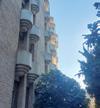

•Storage room •Shabbat Elevator
•Private Parking Spot •2 balconies
Walking down King George St. in Jerusalem and want a cold bottle of water?
Come help yourself to a bottle at 52 King George.
In loving memory of Yoni’s wife
Tziporah a"h, a true Eishes Chayil, always full of chessed, kindness and laughter, and brought life and strength to so many people, that she touched! She was like Aron, who loved peace and pursued peace.

Yoni thanks Hashem for having the opportunity of having Tziporah in his life, to learn of her caring, patience and happiness, to overcome her challenges. May Tziporah's Neshama be a light onto the world, in a time of darkness, and may her Neshama shine to Gan Eden. Yoni misses Tziporah with tears in his eyes, as Hashem gave him a gift, a crown jewel, now he returns her to Hashem. With thanks and Toda. Love, Yoni
Lovely Bright & airy apartment, with lots of lights. Absolutely Prime location, near The Great Synagogue, Ben Yehuda St. & a walking distance to the Kotel. 2 balconies (1 full Sukkah), 2 full washroom, an extra service balcony. - Price
To help refill the supplysend tax deductible donations for Be’er Tziporah a"h Bottled Water Gemach to Chabad of RechaviaRabbi Yisroel Goldberg email
Rabbi@JerusalemChabad.org 02 800-1717
www.JerusalermChabad.org/DonateShekels

enumerated. Yishmael dies. His descendants dwell from Egypt to Assyria. Yishmael’s story is brief. He has numerous and powerful offspring. The brevity
1UniTravel - Medical Insurance at great prices Choose from multiple options
1unitravel.brokersnexus.com
his son Shlomo succeed him. Adoniyahu convinces two very significant personalities - the High Priest and the commander of King David’s armies - to
www.angelrealty.co.il
BY RABBI CHANOCH YERES R av, Beit Knesset Beit Yisrael, Yemin Moshe1UniSim - Sims for USA and Worldwide
For Sale in Efrat
Zayit: * 300 meter cott age, Pitum Haketoret St. 4,990,000 NIS
Starting at $40 sales@1unisim.com
Call 077-400-3199 or USA 718-715-0001


*The Village – 8 room cottage, 4,700,000 NIS
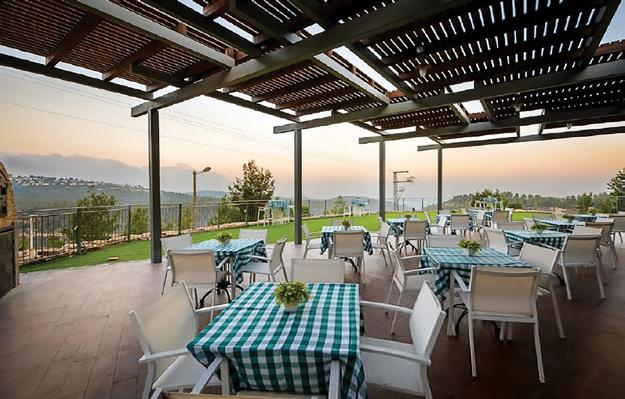
When Avraham addresses the people of Cheit, trying to acquire a burial spot for his wife, he says “Ger V’Toshav Anochi Eimachem” (23:4) “A Stranger and a Resident am I with you” This seems to be a contradiction. If one is a stranger than he is not a resident, if he is a resident than he is no longer a stranger. What did Avraham mean?
Dagan: * 4 room garden apt. 100m, 2,590,000 NIS
* Duplex with amazing garden – 6 rooms. 3.65 million
The Magid of Dubno (Jacob ben Wolf Kranz 1741-1804) explains that Avraham watched how he spoke in this tense situation in order to, both, state his truth and be able to keep the peace -Shalom Bayit. Avraham said, on the one hand, “I am a Resident’ due to G-d’s promise to receive this Land and on the other hand, I still need your agreement to purchase a plot. In other words, Avraham implied “I am the resident” and you are the “strangers”, while they understood him as saying that “they” are the residents and Avraham is the stranger. The peace was kept, and Avraham remained true to his ideals.
Tamar: * Semi attached home - 8 rooms. 4.5 million
Gefen: * 3 room apt. Option to add on a full floor. 1,690,000 NIS
For Sale in Ramot B
We are a young senior couple looking for a 1 bedroom furnished apartment in Jerusalem from December 2021-June 2022
7 room, stunning semi attached home. Great gard en. 6.5 million Gabi- 0524588716
0524419731


The spirit of forgiveness is in the air.
Since the beginning of this month, the month of Elul, Sephardic communities have been reciting selichot, prayers petitioning the Almighty for his forgiveness. They have been doing so each and every day, rising before dawn in order to get to the synagogue on time. Ashkenazic communities, following their custom, will delay the recitation of these petitionary prayers until the week before Rosh Hashanah.
No matter one’s liturgical custom, the theme of forgiveness is uppermost in the consciousness of every Jew. For some, beseeching the Almighty for His forgiveness is their primary concern. Others focus upon obtaining forgiveness from those whom they have offended during the course of the past year. Still others struggle with that most difficult task: begging forgiveness from those whom they have offended. One way or the other, forgiveness is our dominant concern for at this time of year.
When we turn to the Torah portions during these weeks it is only natural
to search the text for references to this important theme. Sometimes those references are readily apparent. For example, last week we read this moving prayer: “Our hands did not shed this blood… Absolve, O Lord, Your people Israel…And do not let guilt for the blood of the innocent remain among Your people Israel…And they will be absolved of bloodguilt.” (Deuteronomy 21:7-8).
But this week’s Torah portion, Ki Tetzei ( Deuteronomy 21:10-25:19), presents us with a challenge. Don’t get me wrong. This week’s parasha contains numerous laws about some very important topics, such as moral warfare, returning lost objects, proper treatment of runaway slaves, divorce, honesty in business affairs, and the concluding cautionary paragraph, urging us not to forget that vilest of our enemies, Amalek. But explicit references to forgiveness are absent.
Several years ago, I decided to meet the challenge and to burrow beneath the surface and find such references. The Talmud teaches us, “If you toil, you will find.” Following this Talmudic advice, I toiled indeed. And I did not toil in vain, for I found quite a few hidden references to
our central theme, one of which I hereby share with you.
There is a passage in this week’s Torah portion which, far from exuding a spirit of forgiveness, reflects almost inexplicable harshness. Near the very beginning of our parasha, is the passage that deals with the ben sorer u’moreh, the wayward and defiant son. It reads:
“If a man has a wayward and defiant son, who does not heed his father or mother and does not obey them even after they discipline him, his father and mother shall take hold of him and bring him out to the elders of his town…They shall say to the elders of his town, ‘This son of ours is disloyal and defiant; he does not heed us. He is a glutton and a drunkard.’ Thereupon the men of his town shall stone him to death. Thus you will sweep out evil from your midst…” (Deuteronomy 21:18-21)
There is no trace of forgiveness in these verses. Our Sages questioned the fairness of such a harsh punishment for such a young lad. Rashi, following Talmudic sources, reasons that this boy is not being punished for his current behavior. Rather, this behavior is indicative that he is headed for a life of great criminality, in which he will eventually steal and even murder in order to satisfy his gluttony and desire for drink. But those of us who read the text, especially if we are or have been parents ourselves, understandably search for some ray of hope for this wayward teenager.
One such ray of hope is found in this passage in the Babylonian Talmud, Tractate Sanhedrin 88b: “This wayward and defiant son, this ben sorer u’moreh, if his parents
wish to forgive him, he is forgiven.”
At first blush we wonder about this leniency. After all, if we are to follow Rashi’s explanation of why he is so harshly condemned, we should be concerned that by forgiving him his parents have let loose a dangerous murderer upon society. The Torah seems convinced that this young lad is inevitably destined for a severely antisocial career. A strict reading of the text demands that we eliminate this potential murderous hazard from our midst. Why should parental mercy of a father and mother be allowed to endanger the welfare of society?
One approach to understanding the power of parental forgiveness is provided by Rabbi Chaim Zaitchik, in a collection of masterful essays, entitled Maayanei HaChaim (Wellsprings of Life). He argues that whereas it can generally be assumed that a young man so wayward and so defiant can never overcome his perverse tendencies, such an assumption must be abandoned if experts can testify that he can be rehabilitated. Asks Rabbi Chaim, “What greater experts can there be than this boy’s own parents?” They know him better than anyone else and if they forgive him, it must be that they have detected in him the capacity to shed the passions of youth which have heretofore led him astray.
This is one lesson of forgiveness. If you know a person well, you know that he can change his ways, and hence merit our
forgiveness.
I would like to suggest another approach to understanding this passage in the Talmud. My approach rests upon my own observations during the course of my career as a psychotherapist. It was during those years of psychotherapeutic practice that I learned that forgiveness changes the behavior of the person who is forgiven. People who have offended others are often so moved by the fact that those others have forgiven them that they commit to a future of exemplary behavior. The experience of having been forgiven by the others signals them that those others trust them. They are so inspired by that new experience of being trusted that their behavior improves radically.
In the words of a preacher that I overheard on the radio long ago, “We don’t forgive people because they deserve it. We forgive them because they need it.”
Sometimes we think that there is a risk to forgiving those who have offended us. After all, we ask ourselves, “Are we not letting him ‘off the hook’? Are we not absolving him from his responsibilities? Does he not consider us ‘suckers’ for having forgiven him?”
But I have found that the opposite is often true. Forgiving the offender ennobles him, and sends him a message which enables him to correct his past habits. In the words of none other than Abraham Lincoln: “I have always found that mercy bears richer fruits than strict justice.”
I must conclude by citing a “higher authority” then the greatest of American presidents. I present you with a verse from Psalms, as explicated by the great medieval
commentator, Abraham ibn Ezra. The verse is Psalm 130:4, recited in many communities during the period from Rosh Hashanah until Yom Kippur.
The verse reads: ‘But with You there is forgiveness; therefore, You are feared.”
As some of you know, I authored a volume of essays on the Book of Psalms. Here is how I phrased the difficulty of this verse: “How does God’s forgiveness lead to our fear of Him? Quite the contrary; one would think that we would be less fearful of a forgiving God, knowing that he would not punish us, but would readily forgive us?”
And here is how I presented ibn Ezra’s response: “He points out that if sinners were convinced that there was no forgiveness for their iniquities, they would persuade themselves that repentance is hopeless. Why reform one’s ways if one was damned to punishment anyway? Precisely the fact that God does forgive removes that hopelessness from them. They realize that if, out of fear of God, they approach Him and beg His forgiveness, they can be hopeful of attaining it. The fact that God forgives…motivates repentance and personal change.”
As we approach the High Holidays, Days of Awe, but also Days of Mercy and Forgiveness, let us be moved by the Almighty’s power of forgiveness to forgive others, to forgive ourselves, and to improve our ways so that we deserve His blessings for a blessed New Year.
Netanya, Nitza, facing sea, 4 bdrm apt rental, long / short term, 1 month min., kosher, available from Sept., furnished and equipped, wifi. aptnetanya@gmail.com
Our responsibility
Brickstone specializing in safety deposit vaults is opening its new branch to residents of Jerusalem and surrounding areas in the Clal Building. At your service are safety deposit boxes of various sizes to store your valuables. The center is secured 24/7 at the most stringent international standards.
The location and boxes are secured by Lloyds International.

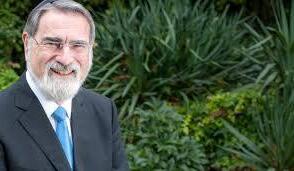
the learning of these Divrei Torah be תמשנ יוליעל HaRav Ya'akov Zvi ben David Arieh zt"l
In a parsha laden with laws, one in particular is full of fascination. Here it is:
If a man has two wives, one loved, the other unloved [senuah, literally “hated”], and both the loved and the unloved bear him sons, but the firstborn is the son of the unloved wife, then when he wills his property to his sons, he must not give the rights of the firstborn to the son of the beloved wife in preference to his actual firstborn, the son of the unloved wife. He must recognise [the legal rights of] the firstborn of his unloved wife, so as to give him a double share of all he has, for he is the first of his father’s strength. The birthright is legally his. (Deut. 21:15-17)
The law makes eminent sense. In biblical Israel the firstborn was entitled to a double share in his father’s inheritance.1 What the
1. This is already implicit in the story of Jacob, Reuben, and Joseph (see below). The Sages also inferred it from the episode of the daughters of Tzelophehad; see Numbers 27:7; Baba Batra 118b.
law tells us is that this is not at the father’s discretion. He cannot choose to transfer this privilege from one son to another, in particular he cannot do this by favouring the son of the wife he loves most if, in fact, the firstborn came from another wife.
The opening three laws – a captive woman taken in the course of war, the above law about the rights of the firstborn, and the “stubborn and rebellious son” – are all about dysfunctions within the family. The Sages said that they were given in this order to hint that someone who takes a captive woman will suffer from strife at home, and the result will be a delinquent son.2 In Judaism, marriage is seen as the foundation of society. Disorder there leads to disorder elsewhere. So far, so clear.
What is extraordinary about it is that it seems to be in the sharpest possible conflict with a major narrative in the Torah, namely Jacob and his two wives, Leah and Rachel. Indeed the Torah, by its use of language, makes unmistakable verbal linkages between the two passages. One is the pair of opposites, ahuvah/senuah, “loved” and “unloved/hated”. This is precisely the 2. Sanhedrin 107a.
way the Torah describes Rachel and Leah. Recall the context. Fleeing from his home to his uncle Laban, Jacob fell in love at first sight with Rachel and worked seven years for her hand in marriage. On the night of the wedding, however, Laban substituted his elder daughter Leah. When Jacob complained, “Why have you deceived me?” Laban replied, with intentional irony, “It is not done in our place to give the younger before the elder.” 3 Jacob then agreed to work another seven years for Rachel. The second wedding took place a mere week after the first. We then read:
And [Jacob] went in also to Rachel, and he loved also Rachel more than Leah … God saw that Leah was unloved [senuah] and He opened her womb, but Rachel remained barren. (Gen. 29:30-31)
Leah called her firstborn Reuben (“God has seen my suffering, maybe now my husband will love me,”), but her hurt at being less loved remained, and we read this about the birth of her second son:
She became pregnant again and had a son. “God has heard that I was unloved [senuah],” she said, “and He also gave me this son.” She named the child Simeon. (Gen. 29:33)
The word senuah appears only six times in the Torah, twice in the passage above about Leah, four times in our parsha in connection with the law of the rights of the firstborn.
There is an even stronger connection. The unusual phrase “first of [his father’s]
3. Genesis 29:25-26. A reference to Jacob buying Esau’s birthright and taking his blessing.
Jerusalem Real Estate is My Business
Eta: 054-723-3863
Amazing stand alone homes in OLD KATAMON, TALBIYA, BAKA, GERMAN COLONY

OLD KATAMON 80 sqm with 2 bedrooms and 2 baths, one flight up with elevator. Completely renovated with terrace that opens into a sukka. Full of light & surrounded by greenery. Very quiet. 4,200,000 NIS
Fantastic opportunity to buy 170 sqm on one floor, with sukka terrace, Shabbat elevator, brand new apartment ready in 1.5 years. Only 6,500,000 NIS.
OLD KATAMON, Moshava
Bldg. 74 sqm, two beds, 2 baths & 2 terraces. 3rd floor great views. Available immediately. 2 elevators, underground parking. 24/7 doorman. 3,650,000 NIS

In BAKA, most sought out location. New apartment duplex of 236 sqm plus 81 sqm of outdoor space. Plus parking. For more info call Eta: 0547233863
ARNONA. Fantastic garden apartment for sale on Lupo Street. 175 sqm 6 rooms 4 bedrooms and 3.5 baths. Extra office downstairs. 60 sqm garden. Storage room. Parking. 8,500,000 NIS
MEKOR HAIM 100 sqm with 3 bedrooms and 2 full bathrooms, registered parking and sukka terrace.


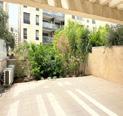
Shabbat elevator
Price 3,850,000 NIS
Eta Morris Realty, Ltd.

etamorrisrealestate@gmail.com
Eta: 054-723-3863
etamorrisrealty.co.il

strength” appears only twice in the entire Torah: here in Ki Teitse (21:17) “for he is the first of his father’s strength”, and in relation to Reuben, Leah’s firstborn:
“'Reuben, you are my firstborn, my might and the first of my strength, first in rank and first in power.” (Gen. 49:3)
Because of these substantive and linguistic parallels, the attentive reader cannot help but hear in the law in our parsha a retrospective commentary on Jacob’s conduct vis-a-vis his own sons. Yet that conduct seems to have been precisely the opposite of what is legislated here. Jacob did transfer the right of the firstborn from Reuben, his actual firstborn, son of the less-loved Leah, to Joseph, the firstborn of his beloved Rachel. This is what he told Joseph:
“Now, the two sons who were born to you in Egypt before I came here shall be considered as mine. Ephraim and Manasseh shall be just like Reuben and Simeon to me.” (Gen. 48:5)
Reuben should have received a double portion, but instead this went to Joseph. Jacob recognised each of Joseph’s two sons as entitled to a full portion in the inheritance. So Ephraim and Menasseh each became a tribe in its own right. In other words, we seem to have a clear contradiction between Deuteronomy and Genesis.
How are we to resolve this? It may be that, despite the rabbinic principle that the patriarchs observed the whole Torah before it was given, this is only an approximation. Not every law was precisely the same before and after the covenant at Sinai. For instance, Ramban notes that the story of Judah and Tamar seems to describe a
slightly different form of levirate marriage from the one set out in Deuteronomy.4
In any case, this is not the only apparent contradiction between Genesis and later law. There are others, not least the very fact that Jacob married two sisters, something categorically forbidden in Leviticus 18:18. Ramban’s solution – an elegant one, flowing from his radical view about the connection between Jewish law and the Land of Israel – is that the patriarchs observed the Torah only while they were living in Israel itself. 5 Jacob married Leah and Rachel outside Israel, in the house of Lavan in Haran (situated in today’s Turkey).
Abarbanel gives a quite different explanation. He proposes that Jacob transferred the double portion from Reuben to Joseph because God told him to do so. The law in Ki Teitse is therefore stated to make clear that the case of Joseph was an exception, not a precedent.
Ovadia Sforno suggests that the Ki Teitse prohibition applies only when the transfer of the firstborn’s rights happens because of the father favours one wife over another. It does not apply when the firstborn has been guilty of a sin that would warrant forfeiting his legal privilege. That is what Jacob meant when, on his deathbed, he said to Reuben: “Unstable as water, you will no longer be first, for you went up onto your father’s bed, onto my couch and defiled it” (Gen. 49:4). This is stated explicitly in the book of Chronicles which says that “Reuben … was the firstborn, but when he defiled his father’s marriage bed,
4. See Ramban to Gen. 38:8.
5. Ramban to Gen. 26:5.
his rights as firstborn were given to the sons of Joseph son of Israel” (1 Chron.5:1).
It is not impossible, though, that there is a different kind of explanation altogether. What makes the Torah unique is that it is a book about both law (the primary meaning of “Torah”) and history. Elsewhere these are quite different genres. There is law, an answer to the question, “What may we or may not do?” And there is history, an answer to the question, “What happened?” There is no obvious relationship between these two at all.
Not so in Judaism. In many cases, especially in mishpat, civil law, there is a connection between law and history, between what happened and what we should or should not do.6 Much of biblical law, for example, emerges directly from the Israelites’ experience of slavery in Egypt, as if to say: This is what our ancestors suffered in Egypt, therefore do not do likewise. Don’t oppress your workers. Don’t turn an Israelite into a lifelong slave. Don’t leave your servants or employees without a weekly day of rest. And so on.
Not all biblical law is like this, but some is. It represents truth learned through experience, justice as it takes shape through the lessons of history. The Torah takes the past as a guide to the future: often positive but sometimes also negative.
6. This is the subject of a famous essay by Robert Cover, ‘Nomos and Narrative’, Harvard Law Review 1983-1984, available at http:// digitalcommons.law.yale.edu/cgi/viewcontent. cgi?article=3690&context=fss_papers. Cover’s view was that “No set of legal institutions or prescriptions exists apart from the narratives that locate it and give it meaning. For every constitution there is an epic, for each decalogue a scripture.”
Genesis tells us, among other things, that Jacob’s favouritism toward Rachel over Leah, and Rachel’s firstborn Joseph over Leah’s firstborn, Reuben, was a cause of lingering strife within the family. It almost led the brothers to kill Joseph, and it did lead to their selling him as a slave. According to Ibn Ezra, the resentment felt by the descendants of Reuben endured for several generations, and was the reason why Datan and Aviram, both Reubenites, became key figures in the Korach rebellion.7
Jacob did what he did as an expression of love. His feeling for Rachel was overwhelming, as it was for Joseph, her elder son. Love is central to Judaism: not just love between husband and wife, parent and child, but also love for God, for

neighbour, and stranger. But love is not enough. There must also be justice and the impartial application of the law. People must feel that law is on the side of fairness. You cannot build a society on love alone. Love unites but it also divides. It leaves the less-loved feeling abandoned, neglected, disregarded, “hated.” It can leave in its wake strife, envy, and a vortex of violence and revenge.
That is what the Torah is telling us when it uses verbal association to link the law in our parsha with the story of Jacob and his sons in Genesis. It is teaching us that law is not arbitrary. It is rooted in the experience of history. Law is itself a tikkun, a way of putting right what went wrong in the past. We must learn to love; but we must also know the limits of love, and the importance of justice-as-fairness in families as in society.

These weekly teachings from Rabbi Sacks zt”l are part of his ‘Covenant & Conversation’ series on the weekly Torah teaching. With thanks to the Schimmel Family for their generous sponsorship, dedicated in loving memory of Harry (Chaim) Schimmel. Visit www.RabbiSacks.org for more.








There is very little to add to the short message expressed in of this week’s haftarah. The ten verses describe so beautifully the dramatic rebirth of Eretz Yisrael and Am Yisrael when Hashem returns from galut with His people. And how beautifully does Rav Yigal Ariel point out the navi’s the repetitive reassurances of Hashem’s promises, echoing His pledges four times in but ten p’sukim and, each time, referring to G-d using four different endearing identities: “Amar Hashem”, “Amar Elokayich”, “Amar Go’alech”, “Amar M’rachamech”. Those simple appellations which describe G-d’s relationship to Israel brought comfort and consolation
This year, while contemplating the haftarah’s depiction of a rejuvenated nation and a revitalized Land, my thoughts turned to my dear friend, colleague and teacher and a source of inspiration for me and many others. It was just some weeks ago when the Torah world and the entire Jewish world lost this remarkable individual and I felt it proper to share with you one of his moving articles, that well reflect his love for Am Yisrael, Eretz Yisrael and Medinat Yisrael. I therefore present to you (in my abridged version) Rav Sholom Gold’s view of the letter that the fruits of Israel were sending to us.
“We, the vegetables and fruits of the Land of Israel, want Jews to know what a dramatic transformation has been wrought over the
past century in our subterranean world.
“After the destruction of the Second Beit HaMikdash a message came from Heaven to all the flora and fauna of this land: “Stop growing!”
“The word spread from cedar to hyssop, from vine to olive, from flower to grain –everything must go dormant. And so, a slumber was slapped on the Land of Israel, and only when the Jewish people would return would we be allowed to begin producing anew.
“We were told not to respond to the foes of Israel who entered the land, and we obeyed. Indeed, over the centuries many foreign invaders came: Romans, Byzantines, Muslims, Crusaders, Turks and more. They all came…but we did not react to their attempts to bring us to life. The land remained barren.
“During that long interlude we, the Indigenous Fruits of the Land of Israel, waited, hoping and praying for the return of this land’s Indigenous People.
“Then, toward the end of the 19th century, rumors began to race beneath the surface of the earth. Birds flying overhead and clouds cruising the skies said, ‘They are coming.’ And the great command came directly from Hashem: ‘O mountains of Israel, shoot forth your branches, and yield your fruit to My people Israel; for they are at hand to come.’ (Ezekiel 36:8) “Grow! Respond to the work of My peoples’ hands!”
“You should have seen the joy beneath the surface. We awoke from hibernation, stretched our roots and smiled. G-d commanded us to turn this small, dry, arid and dusty land into a verdant, fruitful and agricultural world superpower.
“And the Lord further told us: ‘It makes no difference whether these chalutzim are religious or not - they are My children and they are coming home. And so, GROW! Impart your bounty. GROW!’
“And so we did… in abundance. We gave fantastic vineyards to the viticulturalists of modern Israel, from which world-class and holy wine is being vinified. And we brought forth almond, apple, apricot, banana, barley, bean, cabbage, cactus, cauliflower, corn, cucumber, date, fig, grapefruit, guava, kiwi, kumquat, lemon, lychee, mango, melon, , onion, pea, peach, pear, pepper, quince, radish, squash, watermelon, wheat… and so much more! Isn’t this just amazing?
Rabbi Abba taught (Sanhedrin 98a) that “There is no greater sign of the geulah than the agricultural re-blooming of the Land of Israel,” while the Bach added (in Orach Chaim 208) that the shechina, enters the Jewish soul through the agricultural produce of Eretz Yisrael.
”They are bearers of a Divine message: that G-d has re-juiced the Land of Israel so that all His children can come home and live in plenty.
In all honesty, there are times that, upon reading Rabbi Gold’s articles or hearing his lectures, I feel that the prophet himself had placed these messages in his heart. The underlying message of our haftarah is well expressed in Rav Gold’s “letter”.
The vegetables were correct! The fruits got it right.
And, indeed, we should listen to the tomato…and to Rabbi Gold…..
And to Yishayahu!
Sunday, August 20th - Full Day of Learning was sponsored by the Friedman Family in loving memory of Raizel bat Osher a"h on her shloshim
Rabbi Yitzchak Feigenbaum's Shiur
Wednesday, August 23rd is sponsored by Avigail Barzilay in loving memory of her father Simcha Alter ben Aharon z"l
Rabbi Bienenfeld's Gemara Shiur - Thursday Aug. 10 was sponsored by Phil Sevrinsky in loving memory of his mother Blanche Sevrinsky a"h - ה"ע ןהכה הנוח תב לחר המולב
Rabbi Goldscheider’s Shiur
has been sponsored for the 2023 Academic Year
ל’’ז המלש ןב בוט םשו ה’’ע םהרבא תב םירמ תמשנ וליעל
Rebbetzin Shira Smiles Shiur
is sponsored for the 2023 academic year by Dr. & Mrs. Menachem Marcus in memory of their parents, Rose & Dr. Emanuel Marcus z”l -
ל”ז סוקרמ השמ ןב יכדרמו ריאמ ףסוי תב לזייר Rosi and Ernest Strauss z”l -
ל”ז סוארטש דוד ןב לאינדו םהרבא תב דומיל
Rabbi Breitowitz’s Tuesday ShiurMinchat Chinuch
is sponsored for the academic year 2023 by Rabbi Refoel & Sharon Auman in memory of their parents Edith & Reiner Auman z”l
ד”יה לאפר תב ה”ע רתסאו ל”ז קודצ ןב הנוי and their son Rabbi Shmuel Eliyahu Auman z”l
י”נ לאפר ברה ןב ל”ז והילא לאומש ברה
Rabbi Goldin’s Shiur
is sponsored for the 2023 academic year by Dr. & Mrs. Menachem Marcus in memory of beloved aunts Irma Haas a”h and Hilde Myer a”h
Rabbi Manning’s Shiur
has been sponsored for the 2023 academic year
ל’’ז ןמלק ןב גילזו ה’’ע תידנרב תב הנרב תמשנ יוליעל
Rabbi Taub’s Weekly Thursday Parshat HaShavua Shiur
is sponsored by The Jewish Legacy Foundation
(Resumes Sept 10th)
SPECIAL EVENT
8:30PM
Rabbi Gold zt'l,Tribute
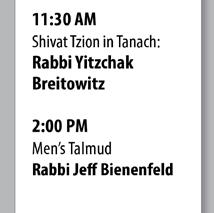
Kehilat Zichron Yosef
Har Nof
SPECIAL EVENT
8:00PM
Next Gen Elul Midrasha
(Women 20's - 40's)
SPECIAL EVENT
9:15AM - 1:00PM
L'Ayla Morning of Learning for Women



3:00PM
Hebrew on the GoScavenger Hunt
@ the Aquarium (For Young Olim Families)
3:00PM
Next Gen Elul

Midrasha Trip to Kever Shmuel HaNavi
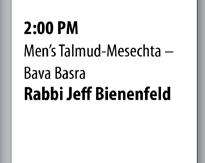
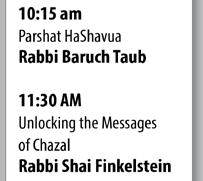
(Women 20's - 40's)
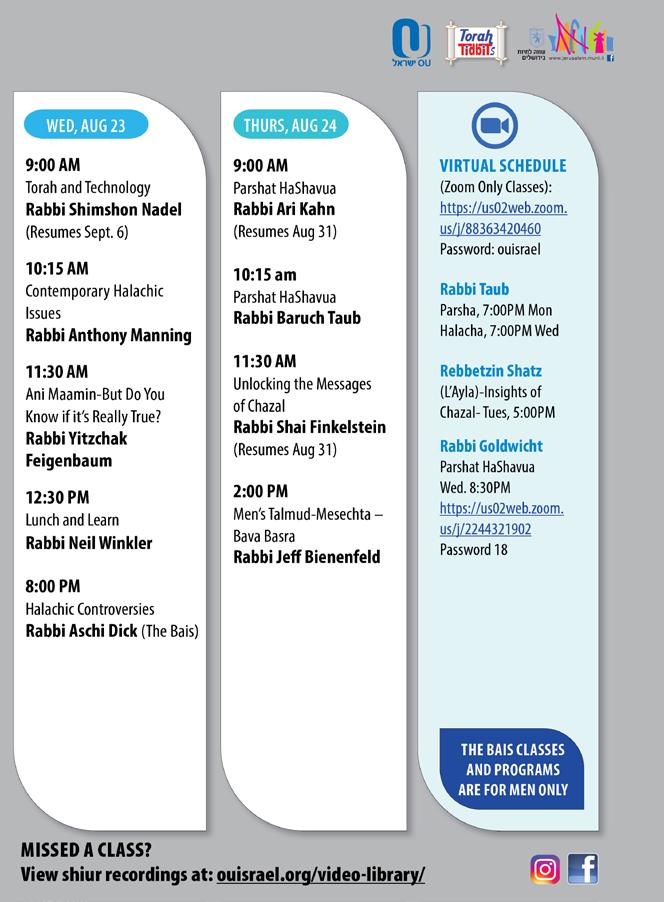
Join us for a free webinar
Wednesday, September 20th at noon. To register contact Paul Kaplan (212) 613-8258 or KaplanP@ou.org
Dr. Deborah Polster resuming her Jewish History classes on Tuesday September 5th, 12:15 - 1:15PM
This course will examine the interaction of forces that operated in the early years of the modern state of Israel: Arab-Jewish tensions, religion vs secularism, anti-Semitism, the Cold War and oil. We will discuss the saga of the kidnapping of the Yemenite children, the complex maneuverings that led to the Six Day War and Resolution 242, the development and growth of the Israeli republic, the higher standard to which the Jewish state is held and the illusive search for peace and security as world leaders continued to exploit Jewish aspirations to further their own agendas.
GET FIT WHILE YOU SIT: Exercise for ladies
Sundays 12:45-1:30pm at the OU Israel Center Sura Faecher 0504153239

Director Hadassah Jacob 052-384-7230
Monday Evenings 7:00 - 9:00pm
Resumes Sept 4th
PLEASE NOTE TORAH TIDBITS ADVERTSING DEADLINES THROUGH SUKKOT

Shabbat, Sep. 1-2 » Sunday, Aug. 27th
Shabbat, Sep. 8-9 » Sunday, Sep. 3rd
Rosh Hashana, Sep. 15-16 » Thursday, Sep. 7th
A small Sefer Torah with its own Aron Kodesh is available to shiva houses or for any other necessary occasion on a temporary free-loan basis.
If needed call Uri Hirsch 0545513173
Shabbat/Yom Kippur-Sukkot, Sep. 22-23
» Thursday, Sep. 14
Call Ita Rochel: 02-5609125 or ttads@ouisrael.org


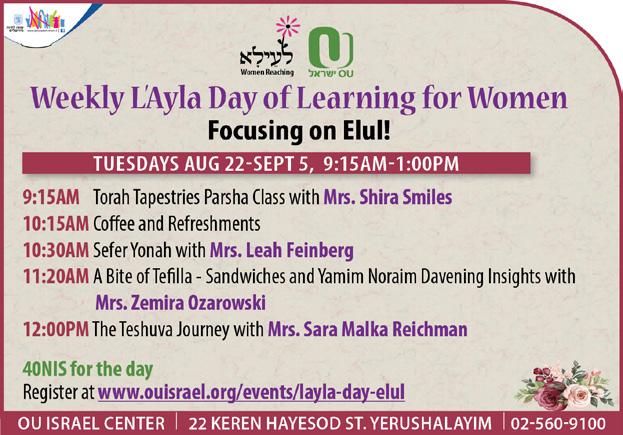






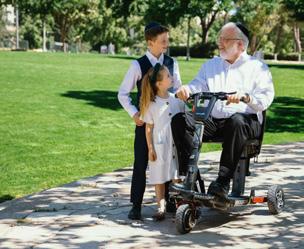
יריׂש ע רֹוד םג 'ה להקב יבאֹומו ינֹומע אֹבי־אֹל
־אֹל רׁש א רבד־לע :םלֹוע־דע 'ה להקב םהל אֹבי־אֹל
םירצממ םכתאצב ךרדב םימבו םחלב םכתא ומדק
םרא רֹותפמ רֹועב־ןב םעלב־תא ךילע רכׂש ר ׁש או
־אֹל אוה ךיחא יכ ימֹדא
An Ammonite or Moabite shall not enter the assembly of Hashem; even the tenth generation shall never enter the assembly of Hashem. Because they did not greet you with bread and water on the way, when you left Egypt, and because he [the people of Moab] hired Balaam the son of Beor from Pethor in Aram Naharaim against you, to curse you…. You shall not despise an Edomite, for he is your brother. You shall not despise an Egyptian, for you were a sojourner in his land. Children who are born to them [in] the third generation may enter the assembly of Hashem. (Devarim 23: 4-5; 8-9)
The Torah highlights that a male from

Amon and Moav is not able to convert and become a part of the Jewish nation. The reason is provided as well. Because they did not provide certain necessities to us when we requested food and water on our journey from Egypt to Israel. Yet, surprisingly, the Torah informs us only a few pesukim later that an Egyptian who converts is able to become part of the Jewish nation after three generations.
Many commentators are bothered by this distinction. The Egyptians threw our children into the Nile and oppressed us, yet we allow them to enter the fold after three generations. Amon and Moav did not physically oppress us, they just withheld necessities from us. It would appear that the Mitzrim were crueler than Amon and Moav and should not merit joining our nation. Why does the Torah prohibit Amon and Moav from ever converting, and allows the Mitzrim to do so?
The Yam Simcha offers the following explanation. The Ramban suggests that since Avraham saved their ancestor Lot, Amon and Moav owe us a debt of gratitude. Although this occurred hundreds of years earlier, one should show appreciation for such an act. Their having withheld food and water from us portrays the midah of Kafoy Tovah (lack of appreciation).
With respect to the Egyptians, although they killed us, earlier in history they
Torah before were now keeping it because of this connection to Hashem’s essence.
Secondly, the Torah given at Mount Sinai is able to have an effect on the physical world whereas before Torah and mitzvot were considered strictly spiritual matters.
provided us with a place to live as well as sustenance during the early days of the famine (in the time that Yosef was second in command). For this we are grateful and therefore eventually (after three generations) allow them to become part of our nation.
Later in the parsha we are informed of the halacha that when one provides a loan and takes a security to secure the loan, he is obligated to return the security if the borrower is poor and needs the object.
The Talmud (Shabbat 88b) states that when the Jews heard G-D’s divine voice, they all died from its intensity and afterwards G-d brought them back to life. I think this emphasizes why Hashem cannot be openly present in this world. For if he was, the Jews’ free will would no longer be preserved and we would follow Hashem in everything. If his awe and will were so apparent, we would be compelled to follow him without having a real choice.
You shall return the security to him by sunset, so that he may lie down [to sleep] in his garment, and he will bless you… (Devarim 24: 13).
JLIC at Tel Aviv University does amazing work in bringing Jews together and teaching us all about the torah we received at Mount Sinai. JLIC, I believe, helps us
The Torah dictates that when the lender returns the security to the borrower, the borrower should bless him. Why is it necessary to include this recommendation that the borrower bless the lender? Again, this is an example of offering gratitude (בוטה תרכה) for having voluntarily returned the security.
In general, when one offers gratitude to another it is a humbling experience. The individual admits that he required assistance and appreciates that another provided him with it. As we begin to recite shlichot- we include the following statement: םינפה תשב ונלו ,הקדצה ה ךלWe are to be humbled. As a nation, we are referred to as םידוהי from the root of the word תודוהל – to express thanks (as well as to admit). This time of year it behooves us to not only seek forgiveness
For Sale: Ben Maimon, 4 rooms, 113m, 2 bathrooms, porch, 1st floor, elevator, 6.2 million NIS
Smadar 050-3114040 // 02-642-4329
for any misdeeds we may have committed to others, but also to express our gratitude to others for all they have done and for being there for us. This includes our parents, spouse, children and friends. May we instill humility and express our gratitude so that we strengthen our bonds with others and make the most of the month of Elul.
smadi_bida@walla.co.il
WOMEN'S WRITING WORKSHOP AT THE OU ISRAEL CENTER
Monday mornings 10.30-12.30
For more details, call Ruth 02-628-7359 or Judy 054-569-0410
BAKA / MEKOR HAIM – 4 rooms, 90m, 2nd floor + elevator, renovated by architect, fireplace, a/c, very central, close to all amenities
In the heart of calm and pastoral BAKAPrivate arab house, 6 rooms, 500m + possibility of building 250m, huge garden, approx. 700m, completely renovated, underfloor heating + a/c, large parking, 5 bathrooms, 5 toilets, green
3050000 NIS MENDEL 052-8980111
MENDEL 0528980111
TALBIEH – 95m, elevator, very well kept, bright, in the corner of building, 3 orientations, accessible
3100000 NIS MENDEL 052-3202488
BAKA - New penthouse, 4 rooms in a small luxurious building with character, alone upstairs, 3rd floor + elevator, 4 orientations, 3 toilets, 2 bathrooms, terrace / sukkah, 70m, parking, store-room
5450000 NIS MENDEL 052-8980111
ADAM ST. CLOSE TO ARNONA HATZEIRAin a step building, very spacious, 5 rooms + terrace, 40m, open view, renovated, private entrance, quiet, potential of adding extra unit.
3290000 NIS MICHAEL 052-3202488
MOSHAVA / In a building after TAMA 38, new apartment, 4 rooms, 3rd floor + elevator, balcony/partial sukah, opened sight, 2 bathrooms, calm, parking
MENDEL 052-8980111
BAKA - stunning 3 storey house on a quiet & pastoral cul-de-sac, very high end designed, swimming-pool, large wrap around garden, parking
MICHAEL 052-3202488
BAKA / MEKOR HAIM - 4 rooms, 90m, 2nd floor + elevator, completely renovated, fireplace, a/c, gas heating, very central, close to all amenities
MENDEL 052-8980111
Near Arnona Hatzaira, in a step building, very
At its most basic level, the mitzvah of hashavat aveida, returning lost objects, seems to be elemental in a functioning society. Showing concern about the property and welfare of others creates an environment of care and mutual love. However, as the Torah can be understood on multiple levels, this halachah teaches us something even more profound and impactful.
The Ohr Hachayim Hakadosh understands this directive as a call to return “lost souls” to one’s “Brother” i.e., Hashem. We each have a responsibility not to ignore those who are on a wayward path, rather we are enjoined to gather them close and inspire them to return to Torah life. “Ve’im lo karov achicha eilecha, ve’lo yadato, va’asafto el toch beitecha - if your brother is not near you, or you don’t know who [the owner is], you must gather it in to your house,” (Devarim 22:2) Allegorically, this verse refers to the times pre -Mashiach during which we are told to bring these lost souls to the “house of Hashem”, to the Batei Midrash, and teach them Torah living.
The law of returning lost objects applies to anything that has even minimal value
and, further, there is no limit to how many times one must return something he finds. A relevant example would be if someone continuously leaves her water bottle at a shiur every week, the host of the shiur must keep giving it back. How much more so, teaches the Chafetz Chayim, one must do what he can to return a lost person, one who is far from his holy connection to Hashem! This mitzvah overlaps with the injunction, “lo ta’amod al dam re’echa –you shall not stand idly when your fellow’s life is in danger.”
Rav Moshe Rosenstein, in Yesodei Hada’at , offers a beautiful mashal to explain this idea. Imagine, a prince who is wandering lost in a forest. Although it is meaningful to provide for the prince’s needs, the greatest kindness one can do is to return him back to the King’s palace. All Jews are benei Melech, children of the King; the greatest kindness we can do is to return Hashem’s children back to His palace.
It is fascinating to learn from the Chovot HaLevavot that there is no comparison between the merit of one who works on perfecting himself to one who positively impacts others. The latter is credited with not only the accomplishments of those whom they impacted for all time, they are also credited with the numerous merits of their families and offspring ad sof kol hadorot, for everlasting generations. One
does not need to be a “kiruv professional” to share an inspirational idea or a new halachah one has learned with family and friends thus helping to bring others just a little bit closer to “home.”

Rav Kestenbaum in Olam Ha’avodah shares another powerful way to impact others. He notes that after 120 years, you can potentially be credited with the return of hundreds of ba’alei teshuva that you had affected. “But I was never involved with these people!” you say with great surprise. “Ah,” responds the High Court, showing you the power of your tefilah when you recited the brachah “Hasheveinu Avinu letoratecha” in the Amidah. When we daven a heartfelt tefilah for Hashem’s chil

Premium delicious shabbes meals



Openning hours: Thursday 12 pm-2 am
Friday 8 am-3 pm


Reb Yitzchak Meir Alter, the first Gerrer Rebbe, also known by the title of his writings, Chiddushei haRi’m, was a talmid of Reb Simcha Bunim of Peshischa and a brother-in-law of the Kotzker Rebbe. He took the Chasidic emphasis of avodah and turned it toward limud haTorah — coming close to Hashem through passionate study of Gemara and Nigleh (‘exoteric’ sefarim). As the beloved founder of the Gerrer Chassidus, he built and lead the largest group of Talmidei haBaal Shem Tov, ‘Students of the Besh’t’, in Pre-War Poland, with dozens of chadarim, Yeshivos and shtiblach. In those days, outside the more concentrated populated areas there were far less opportunities for learning. Therefore, families with means who sought serious Torah education would hire a melamed, a teacher who would often travel from town to town tutoring children.
A Yid once hired such a melamed for his son. This gentle and sweet child struggled to understand and retain learning. Day after day they toiled, and he just couldn’t seem to ‘get’ or remember any of the ideas they studied together. After a few months, the boy’s father excitedly announced that he would be taking his son on a nesiya, a special trip to visit his Rebbe, the Chidushei haRi”m. Bursting with pride, he told
everyone that he looked forward to the Rebbe farhering his son, testing him on the material he’d learned.
Knowing that the boy lacked the skills and ability to ‘speak in learning’ or repeat and explain anything they had studied together, the melamed became more and more anxious in the days prior to the meeting with the Rebbe. He volunteered extra hours and tried to cram as much information into the child as possible. When the father and son finally departed for their trip, the melamed was crestfallen, certain that he would be held accountable for the child’s ‘inability’ to learn anything whatsoever.
When the father and son returned from the trip, the melamed’s jaw dropped in shock when he heard how proud the father was of his talented young scholar. His son had performed beautifully, and the Rebbe had showered him with compliments!
Months later, the melamed had an opportunity to meet with the Chidushei haRim and asked, “How could it be that the Rebbe was so successful with my talmid? I learn with him every day, and he can barely read or understand anything….”
“Ah, my friend,” answered the Rebbe, his face turning serious, “the only way we measure ‘success’ in Torah and one’s ‘level’ in Yiddishkeit is in relation to the student’s ratzon , their desire to learn. It doesn’t
matter if they are studying aleph beis or the most complex sugya in Shas — as long as they are doing their best, they are on the right derech….”
Then, after a moment of reflection, Reb Yitzchok Meir, one of the most respected geonim of his generation, quietly concluded: “Ur Mir kennen den — and in any case, what do we really know?"
ךרדב םילפֹנ ֹורֹוׁש ֹוא ךיחא רֹומח־תא הארת־אֹל
ֹו מע םיקת םקה ;םהמ תמלעתהו
You should not see your brother’s donkey or his ox falling on the derech [under its load] and ignore them. Rather, you shall surely lift up the load with him.”
(Devarim, 22:4)
Rashi clarifies the meaning of the phrase םיקת םקה, “you shall surely lift”: ,הניעט ֹוז וילעמ לפנׁש יֹואּׂשמ ןיעטהל, “This refers to [our obligation of] הניעט, “loading,” i.e., reloading the burden that has fallen off the animal.”
By contrast, the mitzvah of prika is “unloading” a burden that is too heavy for the animal. This mitzvah appears earlier in the Torah:
תלדחו ֹואּׂשמ תחת ץבֹר ךאנֹׂש רֹומח הארת יכ ֹומע בֹזעת בֹזע ֹול בֹזעמ
“When you see the donkey of your enemy lying beneath its burden and you would refrain from raising it, you shall surely raise it with him.” (Shemos, 23:5)
Students of the Baal Shem Tov developed an expansive understanding of this sugya. The verses teach us how to relate to a Yid who is either ‘falling’ or ‘lying collapsed’ under his load — meaning under םימש תוכלמ לוע, the ‘yoke’ of his Divine service.
It takes sensitive chochmas chayim to know when one or the other of these two mitzvos is required of us, and how to fulfill it.
Rebbe Yaakov Leiner, the Beis Yaakov of Izhbitz teaches that the mitzvah of te’ina, ‘loading’, implies helping a Jew who feels lacking or empty. Perhaps he or she has faltered in their ability or desire to uphold and carry תווצמ לוע, the yoke of mitzvah observance. Te’ina here is the opportunity to assist in picking up their load again, and strengthening them to shoulder their obligations and efforts in Yiddishkeit.
On the other hand, there are times on life’s path when the privilege of carrying Torah and Mitzvos can be so challenging and exhausting for a person that they are ֹואּׂשמ תחת ץבֹר, ‘crushed under their load’. Perhaps they are collapsed beneath the weight of the expectations of parents, teachers, community and institutional standards. Perhaps they are immobilized beneath the fear of disappointing such authorities, or even disappointing God Himself. This, explains the Beis Yaakov, calls for the mitzvah of perika, ‘lifting’, not in the sense of reloading, but in the sense of lightening their load. We sometimes need to help a person lessen the spiritual and emotional baggage that can accumulate in our lives of religious striving. Each person needs to find a balanced way to hold oneself up and carry the zechus of being a Jew, and this is not always so simple.
Thus, the Chasam Sofer says the phrase noflim baderech, “fallen on the path” refers to a brother or sister struggling with a spiritual load they can’t currently carry alone.
The responsibility to strengthen such a person is upon every one of us and we are forbidden םהמ תמלעתהו, ‘to look away’ and ignore their experience. Rather, םיקת םקה ֹו מע “pick them up” or uplift them. If someone is off the derech, it means they need a wider concept of the path, or a little help or chizuk, to protect them from the danger of falling.
Yiddishkeit can be challenging, and many of us find it difficult to find hatzlacha in learning and avodas Hashem. Our sedra invites us to reconsider the metrics by which we measure growth, and reframe what it means to carry our own responsibilities and be ‘successful’ as ovdei Hashem. So many among us are struggling to carry great pressures, often while still hurting from stinging criticism or heavy labels


laid upon us in our formative years. If we were told as children that we are unable to succeed, we might strain precariously under the weight of this baggage for several decades.
No matter the challenges, may we know how to pick ourselves up — and to lift someone else up, lighten their burdens and be mechazeik them with a good word or compliment along the way.
And in any case, when it comes to one’s ‘level’ in the derech of Yiddishkeit… what do we really know?

As we read Parshat Ki Teitzei this Shabbat, we will read of the instruction to build a fence or railing around the rooftops of our home: ki tivneh bayit chadash, v'asita maakeh legagecha.
The mitzvah to affix a railing on the roofs of our homes seems like a very straightforward safety instruction. However, if this mitzvah is indeed solely about safety, why does the verse specify- ki tivneh bayit chadash - when you build a new home - Shouldn't this mitzvah apply under all circumstances?
Furthermore, why specifically on the roof, what about other areas of potential danger, for example a steep ravine on our property, or a swimming pool,etc? Might there be more to this instruction than simple safety considerations?
The Chasidic Masters point out that Parshat Ki Teitizei is always read in Chodesh Elul. During these days of Elul, we are preparing ourselves for Rosh HaShanah. Rabbi Yaakov Yosef of Polnoye, the Toldot Yaakov Yosef zy'a, explains that if we wish to rebuild ourselves, to prepare for the new year emotionally, it begins with safeguarding our proverbial personal rooftops - clearing our minds of any inappropriate thoughts, and getting to the proper head space for that new beginning. We must build a proverbial fence around our minds, to only let in that which is appropriate, and protect against outside influence.
BY RABBI SAM SHOR Program Director, OU Israel Center
The Netivot Shalom, the Slonimer Rebbe zy'a, suggests that this interpretation offered by the Toldot Yaakov Yosef, is indeed the level of protection we need to seek as we begin to build for the new year. Each Rosh HaShana provides us with the opportunity to build anew, to conduct a spiritual renovation, ascend to new heights, and build the proper safeguards to enable us to excel in our Avodat Hashem.
Rabbi Moshe Wolfson, shlita further elaborates and suggests that all the spiritual work and growth we seek to accomplish during these days of Elul and subsequent days of the Chagei Tishrei, need to be the impetus for sustained spiritual growth for the entire year. Each year as one year draws to a close and we transition into the proverbial bayit chadash- new home of the coming year, we need to hold tight, to build a railing or protective fence around the growth we have hopefully achieved during these days of Elul and Tishrei, so that we may sustain this growth throughout the coming year.
Yehi Ratzon, May each of us be blessed to both ascend and grow spiritually in the days ahead, and to hold strong to that growth in the year ahead.
Shabbat Shalom.
Beautiful duplex in Nachalat Achim,

4BR, 183m2 built area, 20 m2 sukkah balconies. 1st floor with private entrance. New construction, modern and beautiful design.
Great location! One of the most desirable communities in Jerusalem! Walking distance to Sha'arei

Chessed, Mahane Yehuda Market, and city center.
Come for a visit and be impressed !!!


Authentic Penthouse in Old
4.5BR on the 2nd floor, total area of 140m2. Unique design. Authentic, wellpreserved building. High ceilings and abundant natural light. Mamad (sealed room).
Panoramic view from the roof terrace Sukkah balcony and spacious rooms

Tranquil location.
In proximity to the Jlm Theater, Emek Refaim, Stiebelach, cafes, parks,...
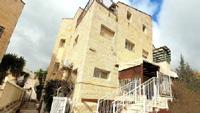
Cottage with tremendous potential, EFRAT

In the Te’ena neighborhood, on four levels. 6BR, 3 bathrooms, 190 sqm. Master suite in the attic with a sunny balcony with an open view. Basement, which was converted into a 3-room housing unit. Requires renovation.
In a quiet and pastoral location. Near a commercial center with shops and restaurants, synagogues, and parks.


Recognizing the extraordinary pressures of wartime and human vulnerability under the threat of death, the Torah allows a Jewish soldier the indulgence of Yifat To’ar. Shockingly, he is permitted to marry an “attractive” Gentile captive despite the numerous halachic and moral red flags which this raises.
The Torah prefers that a morally compromised person operate within halachic confines rather than blatantly violating the Torah. As Rashi comments, the Torah acknowledges the powerful influence of the yetzer harah, and, in this rare instance, accommodates human desires, rather than challenging us to overcome them. This non-conventional halacha showcases how powerful human desire can be.
All human beings are crafted in the image of Hashem, noble and upright. Given our inner virtue, we are naturally drawn to the will of Hashem. Yet, despite this inner purity, our powerful urges and desires often get the best of us, swaying our decisions. We call these desires yetzer harah, which refers both to our inner cravings as well as to an external force tempting us and preying on our conscience.
Sometimes we are enticed by physical desire and other times we are confused by ideological bewilderment. Either way,
we are locked in unending battle with the yetzer harah , without which we would instinctively obey Hashem’s will. Without the counterforce of the yetzer harah we would not possess free will, as we would be ineluctably drawn to Hashem’s will. In this respect, the yetzer harah p reserves human free will, and is elementary to human identity.
Will it always be like this? Will freedom of choice exist in the days of Moshiach? Or will Messianic conditions abolish the yetzer harah and alter the human psyche?
Characteristically, the Rambam adopts an evolutionary view of the Messianic era, based upon the well-known phrase of the amora, Shmuel: תומיל הזה םלועה ןיב ןיא דבלב תויכלמ דובעש אלא חישמה
Shmuel asserted that, in general, the Messianic era will preserve our current order. Global violence will cease, antisemitism will abate, and we will enjoy renewed sovereignty. Shmuel’s minimalist comments do not address the religious consequences of these global changes, but the Rambam (Hilchot Melachim chapter 11) elaborates: widespread tranquility will enable unhindered study of Torah and unobstructed appreciation of the divine will.
Under the Rambam’s Messianic view, human freedom of choice remains, fundamentally, unchanged. We will continue to be challenged by the yetzer harah as we know it. Undoubtedly, enhanced spiritual conditions will influence our religious decision-making and will facilitate greater piety. In a world suffused with the knowledge of Hashem and saturated with divine presence religious belief and practice will be more obvious and the world will be more aligned with Hashem. However, we will still possess desires and urges and will still battle with the yetzer harah. Under Messianic conditions, human free will remains unchanged.
A different image emerges from a bold Messianic prediction of Yechezkel. Both in perek 11 and in perek 36, he cites Hashem’s promise to provide a “new heart” and a new spirit, while replacing our “heart of stone” with a heart of flesh. Yechezkel’s description of a “spiritual” heart transplant implies a drastic overhaul of human identity. He doesn’t specify the religious implications of a “new heart”, but it is obvious that Moshiach will alter human identity.
Similarly, a gemara in Shabbos (151b) views the Messianic era as a revision of human identity. In the 12th chapter of Kohelet, Shlomo Hamelech urges us to remember our creator in our youth before we reach the period of declining desires or ץפח םהב יל ןיא..רשא םינש. Ostensibly Shlomo is encouraging religious commitment during our youth, before it gets too late and our desire for life wanes.
The gemara in Shabbat reinterprets Shlomo’s phrase of “days without desire”
NEW!!! CLASSIC RECHAVIA 4 RM APT IN THE HEART OF THE SHAAREI CHESED COMMUNITY
#2 IBN EZRA CORNER WITH KKL, 4 RMS, 1ST FLOOR, 93 M WITH ADDITIONAL LARGE ENCLOSED BALCONY WITH PARTIAL SUKKAH (OVER 100M IN TOTAL), HIGH CEILINGS, GOOD CONDITION.
ASKING PRICE 5,400,000
CALL DOV SHAPIRO FOR A SHOWING 052.5533739
BEAUTIFUL SPACIOUS BAKA FAMILY HOME FOR SALE
186 SQM SPLIT-LEVEL HOME WITH TWO 40M TERRACES
7 ROOMS, 3 FULL BATHROOMS, 2ND FL (31 STEPS), GREEN AND BRIGHT, PRIVATE PARKING, STORAGE, EXCELLENT CONDITION, CHURCHLAND UNTIL 2077
PRICE REDUCTION!!!
NOW ASKING NIS 5,200,000
EXCELLENT INVESTMENT IN PINUI BINUI PROJECT CLOSE TO EMEK REFAIM

1 BDRM APT RENOVATED AND BRIGHT ON RABBI HISDA ST JUST OFF TSOMET ORANIM, 2ND FLOOR, RENTED FOR 4500 NIS, AFTER PINUI BINUI OWNERS WILL RECEIVE A 3 RM APT BTWN 66-71 M, WITH 12 M BALCONY, PARKING AND STORAGE ASKING PRICE NIS 2,100,000 CALL MICHAL FOR A SHOWING 052.4066620
Ilana Nelson 054.5341403www.integrityrealestate.co.il
as a reference to the Messianic era when Hashem will slaughter the yetzer harah, thereby eliminating free will and discontinuing reward and punishment. In contrast to Shmuel, whom the gemara assumes disagrees with this prophecy, Shlomo Hamelech envisions a Messianic future without a yetzer harah. The divinely promised new hearts of Yechezkel contain no illicit desire.
Elaborating both upon Yechezkel’s prophecy and upon the gemara in Shabbat, the Ramban (Devarim 30:6) portrays the Messianic era as a return to an ideal and sinless state of Gan Eden. The yetzer harah will be entirely purged, and Man, no longer plagued by immoral or illicit leanings, will naturally veer to religion. The arrival of Moshiach will completely re landscape our emotional and psychological makeup, dramatically
transforming religious experience.

Some have qualified this Ramban: perhaps the yetzer harah, as we know it, will be abolished, but we will still encounter a different, less internal form of a yetzer harah. Currently, our yetzer harah is deeply embedded within human identity and exerts powerful influence upon our behavior. Under revamped Messianic conditions, the yetzer harah will be “externalized”, similar to the state of Adam Ha’rishon prior to his sin. Recovering Eden means that we too, will no longer possess inner desires but will face religious questions or temptations. Desire will feel more peripheral and exterior, rather than existential and internal, but it will still exist.


However, even if we adopt this moderated version of the Ramban, it is still obvious that, in the Messianic era human identity will be crafted very differently. We will possess less freedom of choice, but live in a world of greater presence of Hashem. It seems like a tantalizing tradeoff. Are we more interested in human experience or in divine presence? This Ramban forces us to reassess our value system! Would you exchange human choice for Hashem’s presence?
REVOLUTION OF CONSCIOUSNESS
Messianic vision demands that we not sheepishly accept our current condition as the perfect state or as the “only” state of human affairs. Redemptive imagination mandates that we anticipate massive changes to our world. We won’t just live in a different world, but will live the world differently. Institutions such as animal sacrifice and monarchy, which we currently abhor, will be restored and celebrated. Not only will our attitudes and values change, but human psychology will also transform. Hearts will be reinvented, and minds will be remapped. As free will becomes adjusted, human experience will be significantly modified.
The Rambam calls us to imagine a world we don’t yet inhabit. That is the call of redemption.
If you feel that emotional support can be helpful to you or someone you know, please contact Crossroads at 02-624-6265 and a professional Social Worker will schedule a meeting with you. If you are experiencing a crisis, you can reach out to a Social Worker through our Crisis Hotline (050)-HOTLINE.

For over 20 years, Crossroads has offered therapeutic services, under professional clinical supervision, for english speaking teens & young adults, including Gap year students, Lone Soldiers & Bnot Sherut.
*A small symbolic participation fee is requested.
Crossroads Jerusalem

@crossroadsjerusalem
crossroadsjerusalem.org
Yaffo 34, Jerusalem
02-624-6265




+972-50-468-5463 (Hotline) 24h


YESHAYAHU 54:1-10
אֹל יכ ימלכת־לאו יׁשֹוב ת אֹל־יכ יארית־לא ךיתונמלא תפרחו יחכׁש ת ךימולע תׁשֹב י כ יריפחת דֹוע־ירכזת ,אֹל
Fear not, you shall not be shamed; Do not be embarrassed, you shall not be disgraced. For you shall forget the embarrassment of your youth, and remember no more the shame of your widowhood.
In this week’s Haftorah, the Navi foretells of a time when we will no longer suffer shame and embarrassment,
אֹל יכ ימלכת־לאו יׁשֹוב ת אֹל־יכ יארית־לא
ךיתונמלא תפרחו יחכׁש ת ךימולע
Fear not, you shall not be shamed; Do not be embarrassed, you shall not be disgraced. For you shall forget the embarrassment of your youth, and remember no more the shame of your widowhood.
While these terms, ימלכת־לאו יׁשֹוב ת אֹל, seem to be synonymous, the Malbim aims to make a distinction between the two and provide insight into our national emotional experience.
Shame, השוב, is a self-conscious emotion associated with a negative evaluation of
one’s own behavior. Recognizing one’s own mistakes and shortcomings in comparison to one’s goals and expectations leads to feelings of low self-worth and self-punishment. One says to oneself, how could I have done such wrong? What is wrong with me, why am I so weak, so sinful? While shame is inward focused, embarrassment, המילכ, has an external or public component. One is embarrassed when perceiving - accurately or not - that one is being judged negatively by others. In order to be embarrassed, one’s actions must be known to others.
How does one move past shame and embarrassment? Brene Brown, in her famous Ted Talk on Listening to Shame, states that the antidote to shame and embarrassment is empathy. Knowing that there is patience and understanding allows a person to forgive oneself and forget the past.
In the fifth Haftorah of Comfort, Yeshayahu provides this empathy for our people. He encourages the Jewish people to forgive themselves and forget their sins. He assures us that we will forget the sins of our youth. As these sins happened long ago, their memory will fade as will the sense of shame. But we’ve also experienced embarrassment in our old age. We are the allegorical widow who was abandoned and rejected, left to wander alone. The Navi reassures us that we will no longer remember being alone,
דֹוע־י ר כ ז ת אֹל ך י ת ונ מ ל א ת פ ר ח ו. While our youthful ways may be hard to remember and thus forgotten, our more recent experiences may be hard to forget as they are fresh in our minds. And thus, the Navi emphasizes that, דֹוע־ירכזת אֹל, we will no longer remember. Yeshayahu’s empathy will allow us to move forward in our national redemptive journey.
This pasuk is used as the inspiration and template for the stanza recited weekly as part of ידוד הכל:

ה
מו י ח חו תש ת ה מ .ימל כ ת אל ו ישובת אל ימהת, do not be shamed, do not be embarrassed. Rabbi Shlomo Alkabetz, the famed author of this Tefilah expresses our collective feelings of being exiled and hope for salvation. He reassures us with the words of Yeshayahu that the הלואג, the redemption, will bring about a time when we can leave behind the shame of our personal limitations and the embarrassment of our national burdens in the hope that Hashem will redeem us. Each week we experience a taste of redemption with the weekly Shabbos experience. We hope and pray that with deep empathy we will abandon our shame and embarrassment and welcome the arrival of Moshiach.
Carmiel - On Thursday afternoon, a man in his 70s lost consciousness while swimming in a public pool in Carmiel just after 2 P.M. He was pulled from the water by a lifeguard but he was unresponsive and without a pulse. The lifeguard immediately called for medical assistance and began CPR.
On a recent Tuesday morning in Jerusalem, parents were feeding their 6-month-old baby and introduced him to tahini for the first time. Within minutes, the baby developed a severe allergic reaction. The infant's parents immediately called emergency services, seeking urgent help.
United Hatzalah volunteer EMT Shalom Klein, alerted to the emergency through his proximity alert system, sprang into action as the first responder on the scene. Arriving promptly, Shalom was confronted with a distressing sight - a baby boy with swollen lips and tongue, struggling to breathe, and covered in a worrisome rash.

United Hatzalah volunteer EMT Israel Frankel was on his way to the hairdresser on his ambucycle when he received an alert on his communications device. Upon receiving the notification, Frankel flicked on his lights and sirens and raced to the country club where the emergency occurred. Arriving first at the scene in under 2 minutes, the volunteer entered the facility, where he found the lifeguard performing CPR. Frankel took out his defibrillator and attached it to the man, after which he took over administering chest compressions.

Recognizing the symptoms as indicative of an anaphylactic shock, the volunteer knew immediate intervention was crucial. Without hesitation, he administered a life-saving EpiPen injection, delivering a dose of epinephrine to counteract the severe allergic reaction. The powerful medication quickly took effect, and the infant's breathing became less labored. The swelling in the lips and tongue began to subside, providing much-needed relief to the child.
Additional first responders soon joined the efforts, allowing the joint medical team to provide assisted ventilation between the chest compression sets. The intensive care ambulance crew arrived five minutes later at the scene and began administering medication to the patient. After close to 15 minutes, the man’s pulse was restored. The ambulance crew quickly transferred him to the ambulance and transported him to the hospital for further treatment.
As the symptoms continued to recede, the EMT monitored his condition while awaiting the arrival of a mobile intensive care ambulance. Several minutes later, the ambulance team arrived and transported the infant to the nearest hospital for further treatment and observation.
Frankel, who is the deputy head of the Carmiel Misgav branch of United Hatzalah, reflected after the incident and said, “I missed my Shabbat eve haircut but I earned the opportunity to help save a life. I am thankful for the ability to do so, thanks to my training, my equipment, and my ambucycle which allows me to arrive at the scene quickly.”
(Photo credit: United Hatzalah)
Reflecting on the incident, Shalom emphasized the importance of having an EpiPen readily available. "It's a great thing I had an EpiPen in my medical kit," he stated. "An EpiPen can save a person's life within minutes and is a huge help for both EMTs and patients."



 BY REBBETZIN ZEMIRA OZAROWSKI Director of OU Israel L’Ayla Women’s Initiative
BY REBBETZIN ZEMIRA OZAROWSKI Director of OU Israel L’Ayla Women’s Initiative
Even though we already concluded our study of Birchat HaMazon in the last article, I recently came across a remarkable story about bentching that I thought would be important to share with you. The story illustrates a beautiful point brought down by the Sefer HaChinuch. The Sefer HaChinuch writes –
As the clock strikes 6:52pm, the extreme rush and stress right before Shabbos comes to a sudden and abrupt halt as the Shabbos candles are lit, instantaneously bringing with them a beautiful peace and serenity to the home.
Anyone who is careful with their Bentching, his livelihood will be provide for him with respect all of his days
What is the meaning behind the Shabbos candles and how do they cause such a transformation?
Gemara Shabbos 25b brings down that there is a Rabbinic obligation to light Shabbos candles. The Shulchan Aruch 263:2 writes that this mitzvah is of such importance that if one doesn’t have enough money to buy candles, he would be obligated to go door to door and to collect money in order to buy candles!
We spent a lot of time in our Birchat Hamazon series discussing the meaning and significance of all of the Brachot of the Bentching. But beyond understanding the deeper meanings, we also need to make sure to be ריהז with our bentching, to be careful how we recite the Bentching, the respect we give to it, and the way we concentrate and focus. If we do our bentching right, we are told that Hashem will reward us with a good livelihood.
What is so important about this mitzvah? The commentaries explain that the Shabbos candles provide three very significant aspects:
This story is told by Rabbi Yoel Gold and has a profound message for us in our own bentching.
ensures that we will enjoy our Shabbos meal to the fullest.
3. תיב םולש (peace in the home) – Darkness causes strife. When people can’t see where they’re going and they start tripping over the furniture, it causes frustration and irritability. On Shabbos, we want there to be peace and serenity in the house.
request (האווצ) of Menachem Asher is to bentch out of a bentcher”. The family explained that at the age of 16, Menachem Asher had taken on the practice of always bentching from a bentcher and never reciting the bentching by heart. He took this commitment very seriously and would never wash and eat bread unless he was absolutely sure there was a bentcher available in the vicinity. Chaim Ginz heard this and decided to take on this practice as well, l’iluy nishmat this young man.
1. תבש דובכ (honor to Shabbos) - Every meal of importance takes place with light. By obligating us to eat in the light of the candles, we are making a statement that Shabbos is of utmost importance.
2. תבש גנוע (enjoyment of Shabbos) –When one eats in the dark, he cannot really enjoy his food. Lighting candles
Two years ago, after the tragedy in Meron, a man named Chaim Ginz decided to try and be menachem avel as many of the victims’ families as possible. The first family he visited was the Zacbach family in Bnei Brak, who were mourning their 24 year old son, Menachem Asher. At the shiva house, the family gave out bentchers with the inscription – “The last will/
Rav Eliezer Melamed in his book Pninei Halacha explains beautifully - תבש תורנב" "תבש לש התוהמל קומע יוטב ונשי The idea behind the Shabbos candles really mirrors the whole concept of Shabbos. It’s hard for us to imagine because we live in a world of electricity. But imagine life before electricity (or life in a Yishuv where there are frequent power outages �� ). When the sun goes down, the entire world is pitch black. In the olden days, people generally went to sleep once the sun went down. But on Shabbos, the meal only began after dark. Picture the scenario if there were no Shabbos candles - as the family is serving the food, finding their seats, settling down to eat, they cannot see a thing. Their normal safe home has now become chaotic. They can’t find anything, they’re bumping into each other, and tripping over their own furniture. But the moment the Shabbos candles are lit, peace descends upon the home. Everything is calm and in its proper place.
The same is true of the world. During the week, when we look out at the world from a superficial perspective, everything
About a month later, Chaim was feeling pretty stuck. He was having trouble making a living. He was a Sofer and he had just completed a project and was unable to find any more work. Day after day, he would show prospective clients samples of his work but they just kept turning him away. He was feeling very rejected and depressed. One day, he was in a special apartment in Bnei Brak which sofrim use as a place to do their work. He had something to eat and was ready to bentch. He didn’t have a bentcher on him so he was about to bentch by heart. But he remembered his commitment and began to search the apartment from top to bottom. Finally, after many minutes, he located a bentcher hidden under a stack of papers on the top of a bookshelf. He noticed that the bentcher was written in תירושא בתכ, the font used by sofrim. He admired the beauty of the writing and after bentching, he decided to use the bentcher to help him with his own writing. For three hours, he
seems hopeless. There’s a lot of chaos and difficulty, and we can’t figure out what’s going on. But on Shabbos, we’re able to take a step back and look at the world with a more long-term perspective. We remember that Hashem is running the world and that there is a master plan behind all that is happening, there is purpose to all the confusion and strife. When we light the candles, we remind ourselves that we can help to bring some measure of peace to the world by adding the light of Torah and bringing good values to the world.
Rav Melamed concludes as follows –

הנומא לש רוא ףיסוהל ,תבשה לש התמגמ יהוז"
הביחל הביסה תאזש המודמכ .םלועב הרותו
תווצמ תא םיבבחמ לארשי תיב ינומהש הרתיה
תיללכה המגמל זמר הב שיש ,תבש תורנ תקלדה
."רוא תפסות ידי לע םולש תושעל – לארשי לש



This is the goal of Shabbat – to add the light of faith and Torah to the world. It seems that this is the reason for the great love that all Jews have for the mitzvah of Shabbat candles: It alludes to the overarching goal of the Jewish people – to make peace by adding light.
As we light the candles this coming Shabbos, let’s try to take a moment to remind ourselves of this very meaningful message.


Question: I built my house years before the next-door property was developed, with an approximately meter-high wall between properties. My property is 2 meters higher than the next one; now they are excavating to build the other house, there will be a 5-meter drop, which I feel makes it dangerous for my children. [He seems to be building according to the permit he received.] My neighbor had agreed to pay for raising the wall, but now is unwilling to pay the significant cost. We cordially disagree whether it is his obligation. Have I misjudged the matter?
Answer: We praise you for asking sincerely. Generally, we do not comment on active monetary disagreements (see Rama, Choshen Mishpat 17:5). However, after hearing your situation, we felt this would be a case where it was proper to make an exception (see Pitchei Teshuva ad loc. 11; our column from Ki Teitzei 5776), which may be clearer at the end. We are neither interested nor able (due to a lack of information) to present clear conclusions but rather halachic ideas about this type of case.

One important question is whether the
present wall meets safety codes for the emerging situation, as these are generally legally and halachically binding to obligate and exempt from further steps (see Emunat Itecha #139, p. 87-96). This is not unlikely considering you received a Tofes Arba (occupancy permit) despite a significant drop and municipal plans for a future further drop. If so, if your very understandable concern for your children makes you want more, your decision will obligate you.
Most questions about paying for a wall between properties of different elevations concern its serving as a kir temech (retaining wall). In most cases, the wall serves both homeowners, preventing collapse of parts of the ground that support the higher property from falling into the lower property. In such cases, the two owners are to pay for it jointly (see ibid.). The need for / benefit from a kir temech is not always identical, which can impact on the division of payment. You have not told us how the two of you have dealt with the construction of a kir temech and how it is connected to the wall you mention.
Regarding concern for falling, your wall was needed as a ma’akeh. While the formalistic mitzva requires a 10-tefach high fence for a roof (Shulchan Aruch, 427: 1,5),
The Orthodox Union - via its website - fields questions of all types in areas of kashrut, Jewish law and values. Some of them are answered by Eretz Hemdah, the Institute for Advanced Jewish Studies, Jerusalem, headed by Rav Yosef Carmel and Rav Moshe Ehrenreich, founded by HaRav Shaul Yisraeli zt”l, to prepare rabbanim and dayanim to serve the National Religious community in Israel and abroad. Ask the Rabbi is a joint venture of the OU, Yerushalayim Network, Eretz Hemdah... and OU Israel’s Torah Tidbits.


there is a broader and more fluid requirement to avoid danger (ibid. 7-8). While you seemed confident that it had been doing its job (according to most opinions, a meter is more than 10 tefachim), you view your neighbor’s excavating as creating a dangerous situation that requires more than the existing level of caution.

Questions of damaging situations created by what neighbors do on their own property are governed by the often difficult-to-apply halachot of nizkei shcheinim. A broad question with many applications is whether the need to remove the danger/ damage falls on the potential victim (nizak) or damager (mazik). Important determining factors are whether the damage comes immediately and directly (Shulchan Aruch, CM 158:32), the damage’s significance (Shut HaRosh 108:10), and whether the nizak is capable of avoiding the damage (ibid.). We will not analyze your case’s details in these regards because danger of falling has its own prototype – bor (a pit or cistern).
One whose bor’s opening is on the border of another’s property must pay for damage to those who fall in (Shulchan Aruch, CM 410:6). For you, a pertinent question is the drop’s proximity to your property (see S’ma 410:7). It is also possible that the fact that the drop is a result of natural topography and permitted building removes responsibility (see Shulchan Aruch ibid. 9 and commentaries). Also, a 10-tefach wall remedies a bor (Bava Kama
50a). Finally, cheaper methods might be feasible to remove the danger.
Therefore, it is unlikely that your neighbor needs to pay significantly to extend your wall. We trust that these ideas will impact your conversations with your neighbor and are optimistic you will enjoy a good relationship.



 Dassi Zelig Raanana Chapter Madricha
Dassi Zelig Raanana Chapter Madricha
“Wings of Compassion: Reflecting on ןקה חוליש and Elul”


In Parshat Ki Tetzei we are presented with the mitzvah of ןקה חוליש, sending away the mother bird. ם״במר explains that the rationale behind the mitzvah is compassion and prevention of the deepest form of pain to a parent. He explains that since the immense love that a parent has for a child is instinctual as opposed to intellectual or a learned behavior, even an animal can possess it and it would be cruel to take the egg without sending away the mother.
Through this explanation we see that the Mitzvah of ןקה חוליש is a reflection of Kibud Av Ve’am. ןקה חוליש is having Kavod for other’s parents, specifically mothers. Furthermore, the Torah explicitly states that these mitzvot have the same reward of long life, םימי תכראהווךל בטיי ןעמל.
I believe we can learn a valuable lesson from the apparent paradox of the Mitzvah of Kibud Av Ve’am. On a superficial level, it seems that Kibud Av Ve’am is ןיב ורבחל םדא since this is a Mitzvah between people (i.e. parent and child). However, it is interesting to note that this Mitzvah is listed among the first 5 on the תוחול.
Why is a ורבחל םדא ןיב Mitzvah on the ןיב םוקמל םדא side? ן״במר suggests that the Mitzvah of Kibud Av Ve’am is unique as it bridges both the mitzvot of םוקמל םדא ןיב and ורבחל together. This Mitzvah has both aspects within it.
As we just entered into Elul and are spending the upcoming month introspecting, mending our relationship with Hashem and doing teshuva I believe it’s vital to view this time as the bridge between םוקמל םדא ןיב and ורבחל. We ought to work on both of these aspects in each of our lives. Oftentimes we perceive לולא and ירשת as a time to only work on our relationship with Hashem but just as Kibud Av Ve’am bridges םוקמל םדא ןיב and ורבחל םדא ןיב so too could this time period. Shabbat Shalom!
Yehuda Sunshine Raanana
12th Grade
ירצמ בעתת־אֹל אוה ךיחא יכ ימֹדא בעתת־אֹל ֹוצ ראב תייה רג־יכ
Do not hate an Edomite, because he is your brother. Do not hate an Egyptian, because you were a stranger in his land.
Why, as לארשי םע is about to enter ץרא לארשי , does Moshe command them not to hate the Egyptians? Wouldn’t they be justified to do so after the way they were
treated and persecuted? Has enough time really passed to have this expectation?
Rabbi Jonathan Sacks makes a very powerful statement about freedom. He says, “To be free, you have to let go of hate.”
And with this idea in mind, we can understand Moshe better. Moshe declares this specifically as לארשי םע is about to enter the land as a fully free nation. He is teaching them one of the fundamental principles of freedom; freedom is not only one of the body, but also, and possibly even more importantly, one of the mind. םע לארשי has been physically free for 40 years from the harsh slavery and oppression in Egypt, but if they were to continue to hate the Egyptians, they would have remained psychologically enslaved to them.
In our time, 3300 years since leaving Egypt, we don’t carry this anger towards
the Egyptians, yet Moshe’s message is still relevant to us today. Throughout our lives, we have situations where we feel frustrated, hurt or angry with others and the lesson for us to learn is the importance of letting go. Holding on to anger can weigh us down. To really be free, Moshe teaches us the gift of letting go and the freedom it gives us.
For rent on Emek Refaim

4 rooms, 80m, parking, 2 small mirpests, 25 stair walk up, quiet as it does not face the street. Perfect for young family/roommates. 6200nis/month
Great family apartment in the best part of Katamonim Spacious 4.5 rooms, 100m with a 9m Sukka mirpeset, one floor up, good shape, 4 exposures, newly enovated bathrooms. 3.37m NIS
Great Deal in the best part of Har Choma right next to the Community Center
Shopping & Shuls, 3 room spacious apartments with 2 bathrooms, Sukka mirpeset, Shabbat elevator, parking & storage, move in condition. 2.14M NIS
